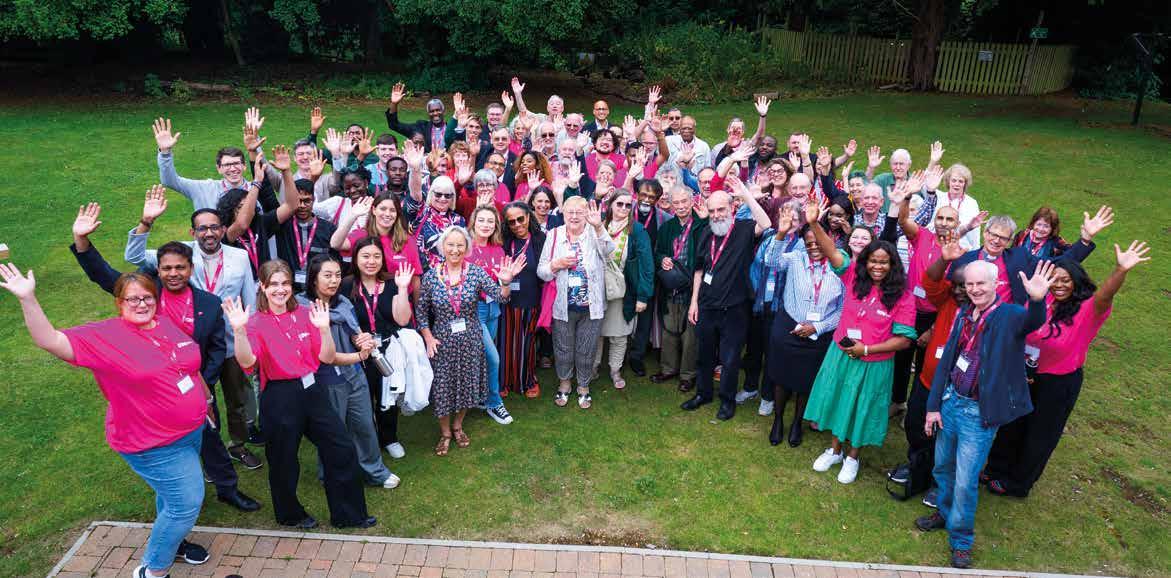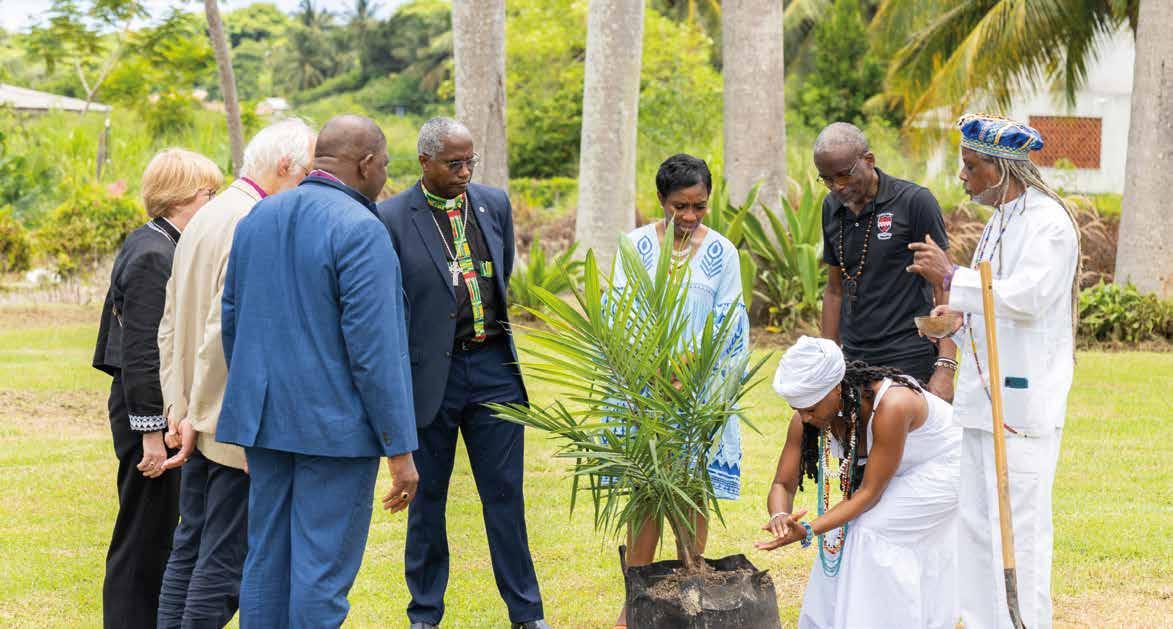
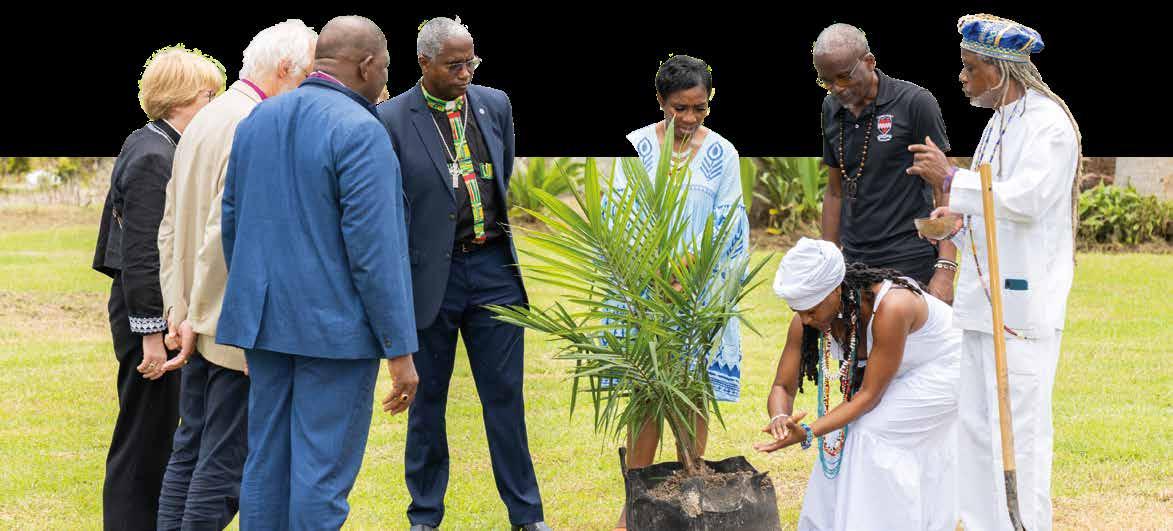
Trustees’ Report and Financial Statements For the Year Ended 31 December 2024
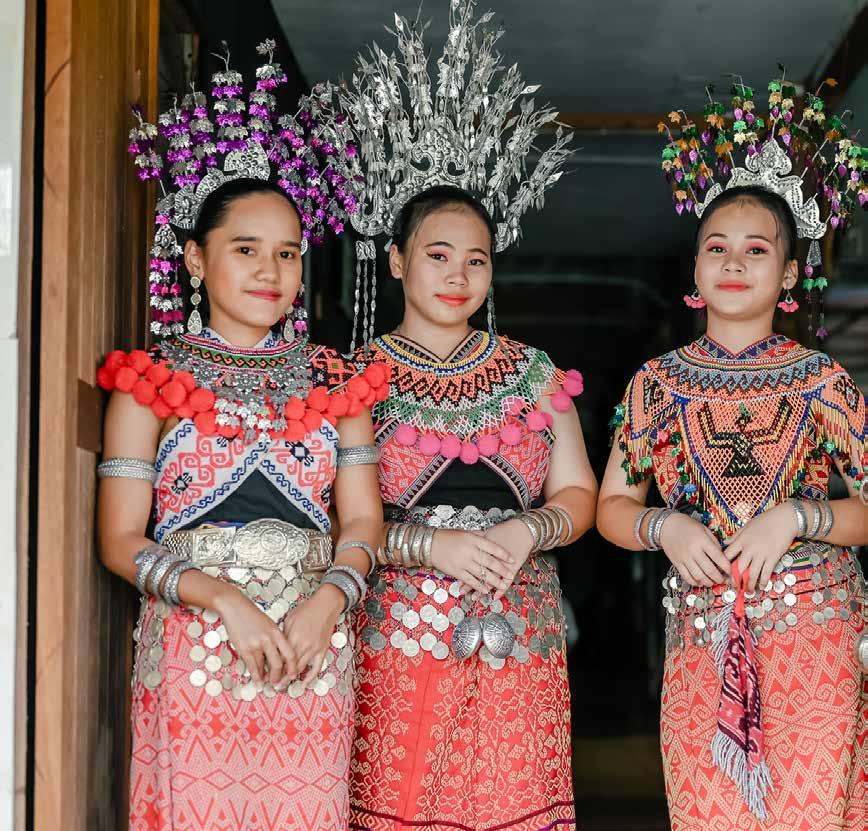



Trustees’ Report and Financial Statements For the Year Ended 31 December 2024

President:
The Most Rev’d and Rt Hon Justin Welby, Archbishop of Canterbury
Trustees:
The Rt Revd Dr David Walker (Chair) +
Mr John Neilson (Chair, term ended 10 July 2024) +
Mr Martin Uden (term ended 10 July 2024) +
The Venerable Dr Chigor Chike (Chair of the Global Mission Programmes Committee) #
Ms Sheila Cook (term ended 10 July 2024) +
The Revd Charles Cowling (Chair of the Finance and Audit Committee)*
Ms Catriona Duffy *
The Very Revd Joe Hawes
Mr Mathen Thomas *
Ms Catherine Wickens #
Mr Peter Wienand #
The Revd Dr Carlton Turner (term ended 10 July 2024)
Ms Christine Dyer (appointed 10 July 2024 and Chair of People and Culture Committee) +
Mr Samuel Williams (appointed 10 July 2024) +
Ms Rosemary Dawson (appointed 10 July 2024)
Professor Emma Wild-Wood (appointed 10 July 2024)
* Members of the Finance and Audit Committee
+ Members of the People and Culture Committee (previously known as Remuneration and Personnel Policy Committee)
# Members of the Global Mission Programmes Committee
General Secretary:
The Revd Canon Dr Duncan Dormor
Directors:
The Revd Canon Dr Duncan Dormor, General Secretary and Chief Executive
Mr Vijay Christian, Director of Finance and Operations
The Revd Canon Dr Peniel Rajkumar, Global Theologian & Director of Global Mission
Mrs Atim Henshaw, Director of Communications, Engagement and Fundraising
Address:
5 Trinity Street, London SE1 1DB
Charity registration: 234518
Auditors:
Knox Cropper LLP, Chartered Accountants, 65-68 Leadenhall Street, EC3A 2AD.
Solicitors:
RWK Goodman LLP, 69 Carter Lane, London, EC4V 5EQ
Principal bankers:
Barclays Bank Plc, 1 Churchill Place, London, E14 5HP
Investment managers:
CCLA Investment Management Ltd., 1 Angel Lane, London, EC4R 3AB
Savills Investment Management LLP, 33 Margaret Street, London, W1G 0JD
Property Advisors:
Ingleby Trice, 10 Foster Lane, London, EC2V 6HR


Dear friends,
My first few months as chair of USPG have flown past. It has been really exciting for me to get a much closer look at the amazing work we play in our role as partners, across the Anglican world. We have inherited a tremendous legacy of respect and goodwill, built up over the many decades during which we have worked alongside churches across the Communion, enabling the Good News of Jesus Christ to be proclaimed ever further and wider.
Back in our early days, that Good News was proclaimed in a voice that carried a distinctively British accent. I rejoice that in this present generation, the voice, and indeed language, is far more likely to be that of the community where the work is being carried out. Moreover, our task is not only to enable distinct voices to be heard more clearly in their local communities, but to create a space in which insights from any part of the Communion can be carried across geographical and cultural boundaries, to benefit all. To be part
of a global Communion is not simply to sing an occasional hymn of African origin, or add a prayer from Asia to our liturgies, it is to engage with each other’s contexts and theological insights. Our recently formed Communion Wide Advisory Group has a vital part to play in helping us to hear and attend to those diverse voices. I was delighted that the group were able to gather in the Diocese of Sarawak, in Malaysia, for our first in person meeting.
One particular charism of Anglicans, with our forty plus autonomous provinces, is that we embed our mission in many different cultures, yet without ever losing ourselves totally within the society around us. Our global connections help us to keep a critical eye on the contexts in which we minister, whilst recognising that no province has a veto over how another one seeks to be faithful to Christ. Bringing together voices from diverse parts of the Communion, plays a vital part in how this dynamic operates.
Some of those voices rightly criticise aspects of our past. Travelling to the Codrington Estate on Barbados last autumn was, for me,
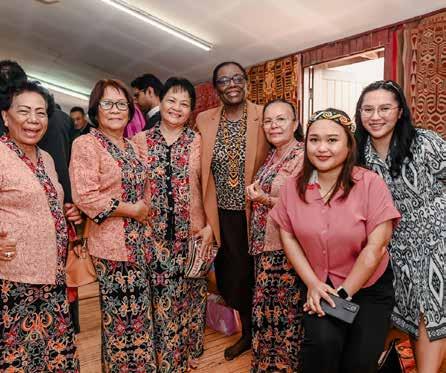
both deeply humbling and tremendously encouraging. Humbling because our forebears exploited enslaved workers in order to generate funds used for mission work; encouraging because that legacy spurs us on to build a very different future. I was also struck by how much our sisters and brothers in the Caribbean value their connections both to the UK churches and those of the West African lands from which their ancestors were so cruelly transported. Again, we can work to strengthen those links. The progress we made on our Renewal & Reconciliation: The Codrington project during 2024 provides a solid base for the exciting work now being undertaken across five different themes and strands.
Finally, at my ordination as a bishop, almost 25 years ago, the Royal Mandate
declared me, as it does for all would be Church of England bishops, to be of “good conversation”. I’m struck by the richness of the good conversations USPG is able to convene and host. I know that my own conversation is being improved by what I learn from participating in them, not least at the well attended Annual Conference at High Leigh, where our excellent speakers gave us much on which to reflect. I would also want to draw attention to something new in 2024, namely the series of occasional evening dinner gatherings, which have allowed a deeper conversation around a specific aspect of the life of our Global Communion.
I look forward to what the next year will bring with excitement and anticipation.

We live in very uncertain times, marked by an increasingly fractured world where differences of language, ethnicity, religion and culture are exploited to create division and conflict in the name of nationalism. God’s wounded world cries out for expressions of solidarity, friendship and reconciliation. Faced with this reality, USPG is deeply committed to work across all the barriers that divide us. As children of God, this is critical to the flourishing of our lives together in the Anglican Communion, as we seek to reach out together in compassion and service, working towards the flourishing of the most marginalised in our societies.
2024 has been a year overflowing with new mission initiatives that seek to build such solidarity, friendship and understanding. This has included drawing together theological college principals from across Africa for executive leadership training in partnership with the Nelson Mandela University in South Africa, and fostering networks of seminaries in Asia through the Asia Theological Accompaniment Programme (ATAP). This has implemented a number
of key initiatives including the production of a range of resources in vernacular languages, support for IT infrastructure and scholarships. We were also delighted to hold our first in-person conference of FeAST (Fellowship of Anglican Scholars of Theology) in Colombo, Sri Lanka – a lively and engaging event with 30 theologians from 20 countries across the Communion.
This year has witnessed some key developments in USPG’s commitment to youth discipleship through the first Emerging Leaders Academy in Japan and support for The Episcopal Church of Jerusalem and the Middle East youth conference held in Cyprus: ‘Whom Shall I Send?’. Through these related initiatives, USPG continues to work very closely with the Anglican Communion Youth Network.
In September, we had our first Desmond Tutu Memorial Lecture in York Minster with a very stimulating lecture from The Revd Nontombi Tutu reflecting on the Truth and Reconciliation Commission. Later that month, following a year of preparation, ‘Renewal and Reconciliation’, the project on reparative justice at Codrington, was
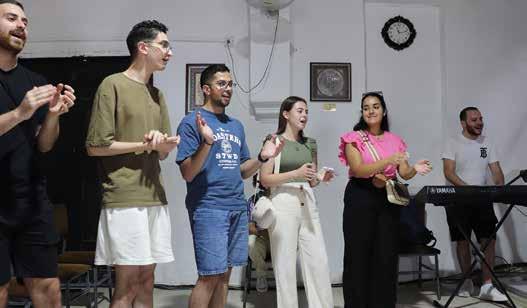
formally launched in Barbados. We were deeply honoured to welcome a wide range of guests from Barbados including Government ministers and community members, as well as The Most Revd Dr Cyril Ben-Smith, Primate of the Church of the Province of West Africa, and The Rt Revd and Rt Hon Dame Sarah Mullally DBE, Bishop of London. Good progress is being made on this long-term project.
As we look to the coming year, we are focused on developing some key trajectories of work. This includes working closely with the Diocese of Durgapur, Church of North India as well as churches across South Asia and the Middle East to
address the evils of human trafficking. We are delighted to be working on this in close partnership with Westminster Abbey. Another important development is a mentoring programme for young African women in leadership, led by the six female bishops known as ‘the Africa Six.’ It was a pleasure to have The Rt Revd Dr Dalcy Dlamini, Bishop of Eswatini, lead our bible studies at the annual USPG conference, ‘United Beyond Borders’.
As ever, we remain deeply appreciative of all those who stand alongside our sisters and brothers across the globe through their support of USPG in prayer, engagement and generous giving.
The USPG strategy (2024-2028) is focused on positioning USPG at the heart of the life of the Anglican Communion as an essential partner and key convening body for mission thinking and practice for its member churches; increasing our brand identity and recognition, especially within the UK; and growing USPG’s financial and human resource.
As part of this approach, USPG will seek to strengthen strategic partnerships and relationships working more closely with:
The core institutions of the Anglican Communion and its networks.
Potential co-funding bodies including universities, research funders and trusts.
Regional Anglican gatherings (CAPA; CCEA).
USPG will also convene and participate in regional networks.
Seek to strengthen dispersed networks within the Anglican Communion (e.g. TEIs, Mission Hospitals).
Further develop multi-lateral programmatic engagement and facilitate innovative missional practice.
Transforming mission thinking and practice in solidarity
We are deeply committed to our three high-level strategic priorities of rethinking mission, energising church and championing justice. These priorities are being pursued in ways that seek to deepen collaboration and partnership, and promote innovation across the following workstreams:
• Our plan to develop theological networks has advanced significantly due to the first in-person FeAST (Fellowship of Anglican Scholars in Theology) conference in autumn 2024. This programme will be further developed through a second in-person conference, webinars, a mentoring programme, and a global online course development.
• Our work on theological resourcing will be further developed through academic publications with contributors from the FeAST network and the Transatlantic writing project and by staff members on various aspects of missiology.
• Programmes supporting leadership and capacity building will continue to be an important area of work in 2025, following several successful programmes, including the Strategic Forum in Ghana. We will work with the Provinces of the Indian Ocean and the Igreja Anglicana de Moçambique e Angola in the coming year. One key partnership will be mentoring and leadership work with women
leaders initiated by the ‘Africa Six’ (the six Anglican women bishops).
• In 2024, our engagement with theological institutions grew significantly through the successful completion of a leadership training programme—supported by Trinity Church Wall Street—for 15 principals of theological colleges across Africa. The development of the next stage of this work will build on the successful Asia Theological Accompaniment Programme and will seek to keep bringing together TEI leaders across Asia as a key priority in the coming year.
• Youth engagement was significantly strengthened in 2024 through several initiatives including the first Emerging Leaders Academy held in Japan, a week providing mentoring and training to young people in The Episcopal Church of Jerusalem and the Middle East and through support of the Anglican Communion Youth Network. We will continue to build and develop on this in 2025.
• We will also seek to strengthen our support for health work across the Communion by reviewing engagement with mission hospitals and producing and implementing a strategy, in partnership with the Anglican Health and Community Network. People and their movement in mission remain central to USPG’s work. Our Exchanging Places programme supports meaningful cross-cultural exchange and service between all parts of the world. It thereby offers a more equal, decolonial
approach to mission. We plan to grow the programme by making arrangements to increase the number of placements in 2026.
• We will continue to develop our work with the Scottish Episcopal Church in addressing legacies of history (especially the complexity of enslavement) and develop our work on racial justice through a range of engagements and events in the UK.
• We will continue to support gender justice through its programmatic work, supporting women’s leadership and enabling Anglican engagement with the UN Commission on the Status of Women (CSW).
• Building on current programmatic work with Anglican churches across Africa, we will seek to expand this gender justice work across other countries in the coming years.
• In addition, our commitment to ecological justice in 2025 will also involve the promotion (and translation) of a key resource; EcoTheology and Ethics.
• A major focus for economic justice in 2025 will be a regional conference on modern slavery and migration held in North India in November. In partnership with Westminster Abbey, it will bring together practitioners from across South Asia and the Middle East to share and develop programmatic work.
• In 2025 USPG will continue to deepen its partnership with The Episcopal Church of Jerusalem and the Middle East through its Lent Appeal and related activities focused on humanitarian relief in Gaza, as well as continuing to support refugee work in the Diocese of Europe.
As part of its broad aim of increasing brand identity/recognition, USPG launched a new, enhanced website in late 2024. During 2025 it will prioritise the strengthening of USPG’s media presence and promoting its key messages across the global churches within the Anglican communion, especially those of Britain and Ireland. Having successfully engaged with the provincial synods of Britain and Ireland and a number of cathedrals, USPG will prioritise its engagement at the diocesan and parish level and provide effective ways for members of UK and global church to give, take action, and pray. USPG will review its fundraising strategy and seek to diversify its fundraising streams, whilst continuing to increase and diversify its supporter base and audiences through events, resources and engagement activities. It will retain its longer-term target of growth on unrestricted income, by 5.5% year on year to £1.8M in 2028.
A solid financial foundation
To support the work of global mission, USPG seeks to grow as an organisation in terms of both its financial and human resources. It recognises the significant barriers to growth and the unpredictable nature of the external environment but has identified high and medium growth targets for 2028 of £4.5M and £4M (with the status quo of £3M as the ‘low’ trajectory). This growth would be generated by an expansion of income from donations following the further development of fundraising income streams of individual giving, church giving, community fundraising,
major donors and trusts and foundations, but also from increased partnership working and co-funding models. This growth would be accompanied by an increase in staff, primarily within the Communications, Engagement and Fundraising team.
Robust Governance structures for a global agency
In 2024 we welcomed a new Chair of Trustees, The Rt Revd Dr David Walker, Bishop of Manchester and four new trustees – Rosie Dawson, Christine Dyer, Professor Emma Wild-
Wood and Samuel Williams. The addition of these trustees constitutes significant progress in terms of the further development of a strong and diverse Board of Trustees which has high-level skills and networks.
The 2024-2028 strategy also sought to establish a Communion Wide Advisory Group (CWAG) and explore ways in which it could engage more effectively with the trustees, the strategy and operations of USPG. The new CWAG, comprising ten members (four women and six men) from various regions of the Anglican
Communion. In addition to online meetings, the group held its first in-person gathering in 2024 in Kuching, Malaysia, with a second planned to take place in Manchester in July 2025. Two members have also been co-opted onto the Global Mission Programmes Committee.
In 2025 we will seek to begin the third element of the strategy in relation to governance: To review the purpose and membership of the Council and make changes to the byelaws, with the aim of simplifying and strengthening USPG’s governance and increasing UK engagement.
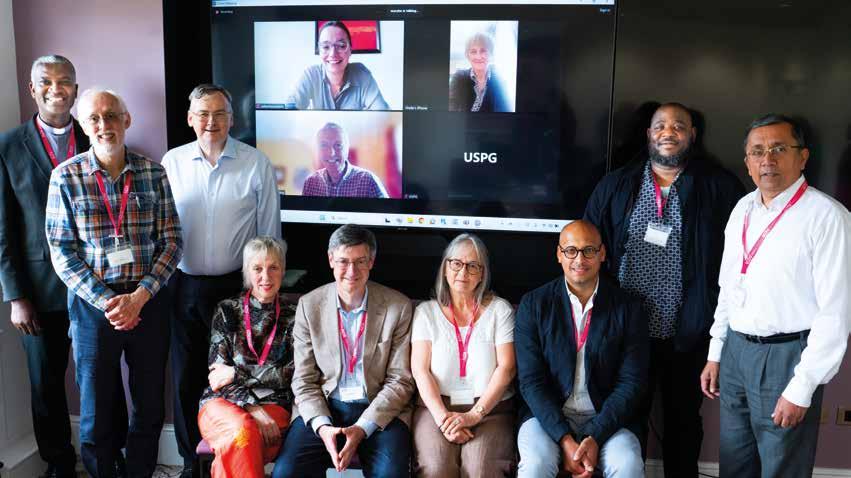
Outgoing and new USPG Board of Trustees
… you are fellow citizens with the saints and also members of the household of God, built upon the foundation of the apostles and prophets, with Christ Jesus himself as the cornerstone
Ephesians 2:12
Transforming mission thinking and practice in a spirit of solidarity has been foundational for the efforts of USPG’s Global Mission Team in 2024. By embracing the spirit of solidarity in our calling to be partners in God’s mission, our work in USPG’s strategic areas of rethinking mission, energising church and championing justice has been all the more grounded in the life-giving witness of Jesus Christ, the cornerstone of our faith. 2024 saw the launch of several new initiatives including the first annual conference of FeAST (Fellowship of Anglican Scholars of Theology), the Emerging Leaders Academy (ELA), the Theological Educators’ Leadership Programme (TELP) and the Desmond Tutu Memorial Lecture. Hope and hard work have characterised our work in 2024 as we persevered in our witness seeking to hold relationship-building and programmatic-accompaniment together in innovative and purposeful ways.
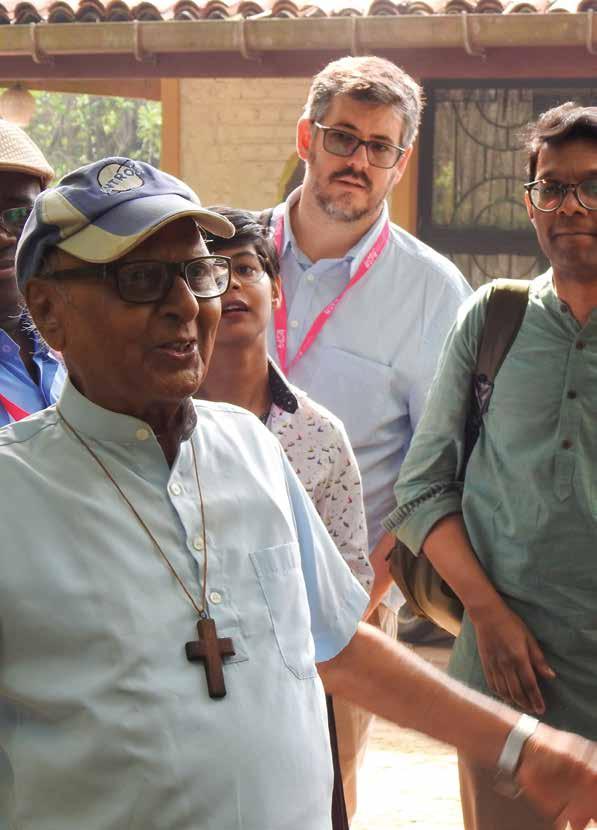
USPG’s work in rethinking mission aims to renew and resource theological thinking from global perspectives; drawing from the theological riches of churches worldwide and strengthening theological education. This is being done by establishing networks that are shaping the next generation of theological voices and supporting Theological Education Institutions (TEIs) in their quest for sustainability and renewal and fostering critical thinking in mission theologies.
Shaping the next generation of theological voices
FeAST (Fellowship of Anglican Scholars of Theology), USPG’s global mentorship programme which aims to create a stimulating platform for encounter between scholars and exchange of scholarship, had its first in-person conference from 9 – 14 November 2024 in Colombo, Sri Lanka. 30 theologians from 20 countries across
the Anglican Communion presented papers on the broad theme “Transformative Theologies: Rethinking Pedagogy, Praxis and Perspectives”. Hosted by the Diocese of Colombo, the programme also involved visits to the Tulana Research Centre where the group spent a day with its director the renowned Asian theologian Fr Aloysius Pieris. FeAST seeks to overcome the ‘opportunities divide’ that affects global theological scholarship by facilitating possibilities for the dissemination and publication of current research, especially for theologians with limited access to academic publishing platforms.
USPG is also involved in a Transatlantic Writing Programme (TAWP) which has brought together younger scholars from the Caribbean and West Africa for writing workshops which focus on the experiences of those who encounter Jamaica and Ghana as descendants of the entanglements of the slave trade.
Supporting Theological Education Institutions (TEIs)
Over the last few years USPG has been accompanying TEIs on their path towards renewal and rejuvenation. As part of these efforts, USPG organised an intensive Theological Education Leadership Programme (TELP) for 15 Deans and Principals of TEIs from five African Provinces (Central Africa, West Africa, Indian Ocean, Southern Africa and Tanzania). This 16-week-long course on Executive Leadership was developed and delivered by the Nelson Mandela University Business School. This training concluded with a final capstone project where each participant presented a particular project related to institutional resilience and sustainability. USPG will accompany these institutions as they seek to apply learnings from programme. The TELP programme was made possible by a grant of $100,000 from Trinity Church Wall Street.

Peniel Rajkumar, Lived Mission in 21st Century Britain: Ecumenical and Postcolonial Perspectives co-edited with Benjamin Aldous, Harvey Kwiyani and Victoria Turner, (SCM Press, 2024).
Sara Fretheim, Daniel Eshun, D. Janice Mclean-Farrell, Anna Kasafi Perkins and Jo Sadgrove. (2024). Drinking from the Same Well?: African and Caribbean Theological Oversights and a Call for Mutual (Re) connection and a Theology of Repair/ Remaking. Exchange, 53(4), (306-335).
Peniel Rajkumar, ‘Afterword’ in Anglican Theology: Postcolonial Perspectives, edited by Stephen Burns and James Tengatenga (SCM Press 2024).
Peniel Rajkumar, ‘The best crystal ball is a rear view mirror’: Decolonising from an Indian Perspective, in Decolonizing the Ecumenical Network: Approaches, Opportunities and Networks (Hamburg: Missionsakademie an der Universitat Hamburg, 2024), (50-62).
In a similar programme aimed at strengthening theological leadership in Asia, USPG brought together 28 Asian theological leaders for the Asia Theological Accompaniment Programme (ATAP). The three-day gathering in June led to the development of a Programme Implementation Plan which provides directions for the future work of ATAP. Following the gathering, key initiatives undertaken so far include support towards IT infrastructure development of the Gujarat Union School of Theology, scholarship support for theological education for one student of the Diocese of Colombo to study in the Kerala United Theological Seminary in Trivandrum, India - conference attendance support for the Deputy Dean of St Michael’s Seminary of the Anglican Church in Korea and an exchange programme for students/faculty of the Theological College of Lanka. Last year USPG also supported the sabbaticals of three Asian scholars who worked on research and publication projects. These included the Principal of the St Andrew’s Theological College, Dhaka, Bangladesh and the Principal designate of the United Theological College, Bengaluru. The ATAP has also led to the production and translation of theological resources in vernacular languages. An introduction to theology in Gujarati language, aimed at both clergy and laity, is under publication by the Principal of Gujarat United School of Theology. A book entitled Water is for All by The Rt Revd Duleep De Chickera, former Bishop of Colombo, has been translated into Tamil. It offers a substantial Christian stance on war, conflict, human rights and reconciliation to the Tamil reading Lankan community (Hindus and Christians, as well as a high percentage of Muslims). Such attempts align with USPG’s aim of supporting
“We each have the power to change our world.” The Revd Nontombi Tutu opens the first Desmond Tutu Memorial Lecture, calling for truth and reconciliation

the production of, and access to, quality theological resources in vernacular languages which will ensure the theological education of all God’s people.
USPG’s work in the area of rethinking mission has also involved challenging theological thinking on mission from global and decolonial perspectives. In a new initiative, USPG established an annual Desmond Tutu Memorial Lecture on Religion and Social Justice in partnership with York Minster and the Desmond Tutu Centre for Religion and Social Justice at the University of Western Cape. The inaugural lecture was delivered by The Revd Nontombi Tutu, an Episcopal priest, human
rights activist, and the daughter of Archbishop Desmond Tutu. The lecture, entitled ‘Truth: The Path to Reconciliation’, was hosted by York Minster on 17 September 2024. The Desmond Tutu Memorial Lecture aims to invite distinguished speakers and thought leaders to examine contemporary issues through the lens of Archbishop Tutu’s enduring legacy and inspire action toward dismantling oppressive structures and nurturing just communities.
USPG’s Rethinking Mission Conference 2024 took place on 2 December in Southwark Cathedral. The conference focused on the 1700th anniversary of the Council of Nicaea. Four eminent speakers - The Revd Dr Kuzipa Nalwamba (World Council of Churches), Bishop Mike Royal (Churches Together in
England), The Revd Dr Susan Durber (URC and the Europe President of the WCC) alongside The Revd Canon Dr Duncan Dormor, offered reflections on the theme ‘Towards Nicaea 1700: Reaffirming our Common Faith for Uncommon Times’ and explored how this moment in Christian history presents fresh possibilities for the reimagination of Christian faith, unity and witness for the healing of a divided humanity and a wounded planet.
In partnership with the Anglican Seminary of the Diocese of Recife and leading national and international organisations (including the Anglican Alliance and Christian Aid), USPG organised an International Colloquium on ‘Theological Education and Post/De(s) coloniality: Theology and Struggles for Climate Justice and Social Equality’. The colloquium took place in Recife, Brazil from 25 - 30 November 2024 and explored the power of Indigenous theologies in addressing the urgent need for de-colonial perspectives within theological discourse and for advancing advocacy and social change. By centring the voices and experiences of Indigenous and traditional communities in Fiji, Aotearoa New Zealand, Polynesia, the Philippines and Latin America, the event sought to challenge traditional, Western-centric approaches to theology and equip faith leaders to advocate for systemic change.
Staff also resource the missional theological thinking of the wider Anglican Communion. USPG staff The Revd Canon Dr Peniel Rajkumar (Global Theologian and Director for Global Mission) and Dr Paulo Ueti (Theological Advisor and Regional Manager for Latin America and the Caribbean) are consultants on the Commission on Theological Education in the Anglican Communion. Paulo supported
the Rome-Canterbury Pilgrimage (IARCUM) of Bishops, as well as the regional Bishops’ training in Latin America - in collaboration with Episcopal Ministry in the Anglican Communion (EMAC). Peniel led sessions in the courses for New Bishop and New Clergy organised by Canterbury Cathedral. Staff also resourced the following gatherings across the Communion
by leading sessions and offering addresses at the Council of Churches of East Asia, Synod of Diocese of Cyprus and the Gulf, Provincial Youth Leadership Training programme of The Episcopal Church of Jerusalem and the Middle East, the Eastern Archdeaconry Synod of the Diocese of Europe, and Woolwich Episcopal Area Bishop’s Study Day.
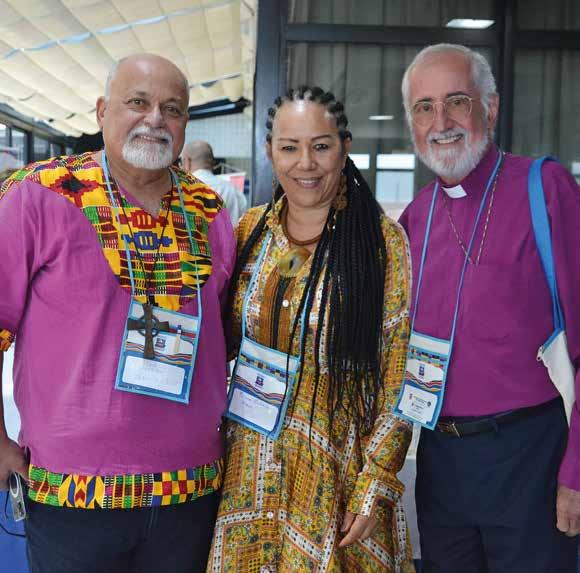
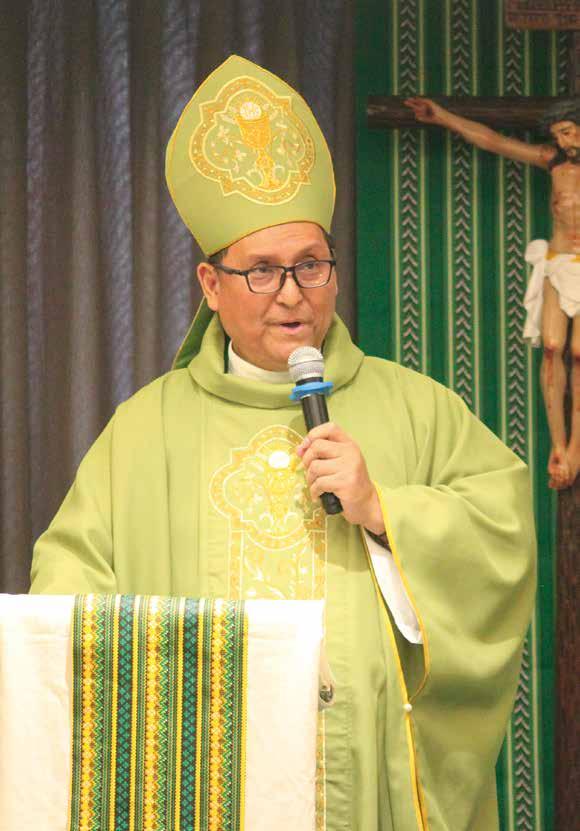
USPG’s work in the area of energising church is carried out through programmatic accompaniment as well as the strengthening and sustaining of relationships with partners. In 2025 our work in this area involved presence and participation in key events in the life of our partner churches, strengthening leadership capacity, fostering opportunities for crossprovincial learning and exchange.
Presence and Participation of USPG in Key Events:
Accompaniment of partners through visits and participation in key meetings and events in the life of our partner churches is foundational for our engagement in energising churches.
For the first time in the last few years, USPG undertook a partnership visit to the Oceania region a move which clearly indicated our intention to engage more proactively with the region. The purpose of the visit was to take part in the Oceania Regional Advisory Council (ORAC), the annual gathering of mission agencies and leaders from the four provinces, namely the Anglican Church of Australia, the Anglican Church of Papua New Guinea, the Anglican Church of Melanesia, and the Anglican Church in Aotearoa New Zealand and Polynesia. This visit also included some time with the Oceania Anglican Fono (aka FONO) the annual gathering of the Primates and General Secretaries from the four Anglican Churches in Oceania.
In September 2024, the USPG General Secretary alongside the Senior Regional Manager for Africa attended the synod of the Anglican Church of Southern Africa (ACSA). The Synod focussed on the theme “Flourishing like a garden: Listening, reconciling and celebrating God’s new creation”. One of the key takeaways
from the Synod was ACSA’s vision for the next decade. They envisage an Anglican community that is prophetic, transformative, inclusive, contextually rooted, and guided by the Anglican Communion’s Five Marks of Mission.
USPG participated in the Strategy Planning meeting of the Diocese in Europe which sought to create a new mission strategy for the diocese, as well as the Strategic Forum of the Internal Province of Ghana. These two examples are a clear reflection and affirmation of USPG’s status as a valued partner by member churches. The meeting in Ghana was significant as the Province of West Africa
intends to continue its journey towards two independent provinces in the coming years: Ghana and West Africa. The visit to Ghana also allowed the General Secretary the opportunity to visit locations associated with the West African slave trade such as the Assin Manso slave bath and Elimina castle in Cape Coast to help inform USPG’s emerging thinking on racial justice.
USPG was also present at the Diocesan Synod of Cyprus and the Gulf, the meeting of the Council of Churches of East Asia in Manila, the 50th anniversary of the Church of Bangladesh and the 200th anniversary
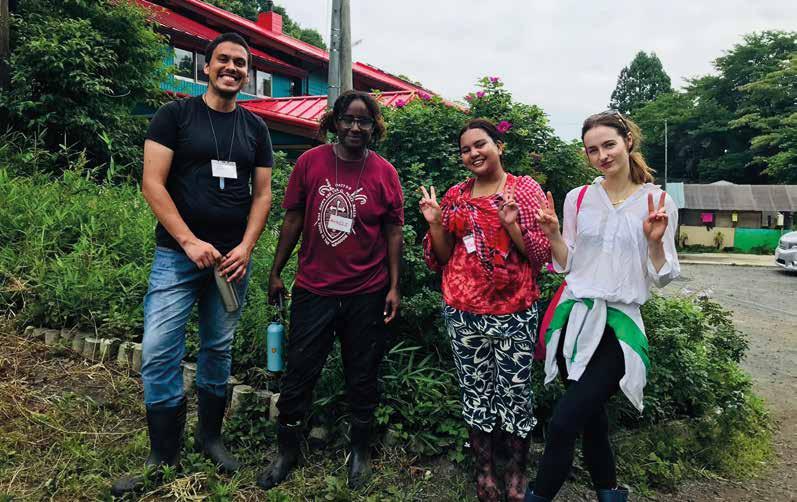
of St Thomas Cathedral in Dhaka and the 100th Diocesan Synod of the Lusitanian Church in Portugal.
One of the highlights of 2024 was the launch of the Emerging Leaders Academy (ELA) a shortterm global youth discipleship programme. The first cohort of ELA participants gathered at the Asian Rural Institute (ARI) in Japan for a three week-long training course followed by a year of online mentorship. The programme focussed on the development of leadership skills and included contextual theology workshops and visits to churches and cultural sites. Six participants from across the Anglican Communion took part in this pilot year. Participants of the programme have been twinned with mentors from across the Communion to enhance learning and its application. The ELA has also enabled USPG to strengthen its relationship with the Anglican Communion Youth Network (ACYN). The ACYN helped choose participants for the ELA programme, and we continue to explore how our partnership might grow in the future.
As part of its strong commitment towards leadership and capacity building among youth, USPG supported The Episcopal Church of Jerusalem and the Middle East’s (JME) Youth Conference: ‘Whom Shall I Send?’, which took place in Cyprus from 26 - 30 August. 25 young people from the Dioceses of Cyprus and the Gulf and the Diocese of Jerusalem participated in this programme. This conference was a deliberate effort by JME to inspire and equip youth for mission. USPG also supported the Church in the Province of the West Indies (CPWI) Youth Ministry Training Programme. The year-long certificate course covers
critical issues such as spirituality, worship, and youth development. The programme has fostered a more robust community among youth leaders and has promoted a shared vision for youth ministry within CPWI and encouraged collaboration and the sharing of best practices between dioceses.
USPG’s Senior Regional Manager for Africa, Fran Mate has been accompanying the six Women Anglican Bishops of Africa, popularly known as the Africa Six, in their strategic thinking as they set up the Centre for Anglican Women’s Leadership and Research in Africa (CAWLRA). She has been invited to join the Advisory Committee of the newly formed centre that has been established in collaboration with The Episcopal Church (TEC). The centre will focus on developing the skills and abilities of young women in leadership roles and how to best utilise them to serve the rapidly expanding Anglican Church in Africa.
2024 also was a time where we developed a new ‘Bonds of Affection Process’, which will serve as a platform for the sharing of best practice in strategic areas of Christian Mission. Under this initiative, USPG, through its convening role, will initiate online gatherings that will bring together church partners working in similar thematic areas for cross-provincial conversations and potential collaboration. The Bonds of Affection Process will aim to provide an opportunity to share experiences and expertise on different mission foci across the Anglican Communion, enable mutual learning and capacity sharing, and build community among USPG global partners. In a good example of fostering cross-provincial exchange of expertise and
resources, our Regional Manager for Latin America and the Caribbean and Theological Advisor Dr Paulo Ueti spent a month in the Philippines (17 February -15 March) teaching and leading a retreat for students and staff of the St Andrew’s Theological Seminary, Quezon City, Philippines. He also led a workshop on ‘Reading the Bible with New Eyes’ for clergy of the Episcopal Church in the Philippines (ECP) and the Iglesia Filipina Independiente (IFI). The Revd Thanduxolo Noketshe, our Exchanging Places partner in the Caribbean, has continued with his ministry of cross-cultural education and collaboration with the Church Province of the West Indies. USPG has been assisting The Rt Revd Dale Bowers of the Diocese of Saint Helena with an Exchanging Places placement, which will commence in early 2026. Other possibilities for Exchanging Places placements are also being explored.
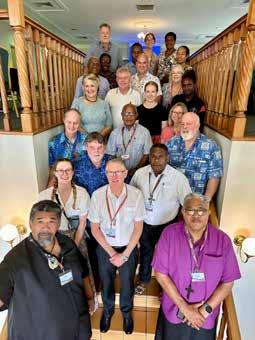
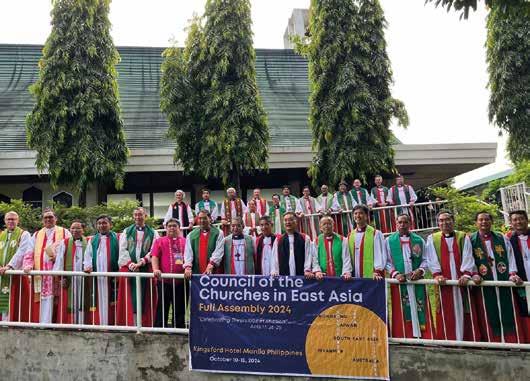
Shaping the Future: The Council of Churches of East Asia Assembly in Manila
USPG’s programmatic work on our strategic priority of championing justice has a focus on advocacy in the areas of racial, economic, ecological and gender justice. Based on our programmatic engagement with churches, it is becoming increasingly clear that this strategic priority of championing justice is often closely intertwined with the strategic priority of energising church, especially when it concerns advocacy training and equipping churches in their prophetic witness.
USPG led a Race Awareness training for the bishops of the Scottish Episcopal Church (SEC). It is hoped that the training will begin a process where the SEC can learn about its past and any links it may have with the slave trade and then consider what should be done to address the findings of research. USPG described this scenario as “the entanglement of church, racism and empire, and how we might approach it today”. This was led by Dr
Jo Sadgrove, Research & Learning Advisor, USPG, The Revd Dr Evie O’Brien of Inclusive Church, who was ordained in the Church in the Province of the West Indies, and The Revd Garfield Campbell, a PhD student from Jamaica who is researching the legacies of slavery.
As part of our work in promoting racial justice among churches in Europe, USPG supported the Diocese in Europe’s Racial Justice Conference which focussed on the theme ‘All of Us or None
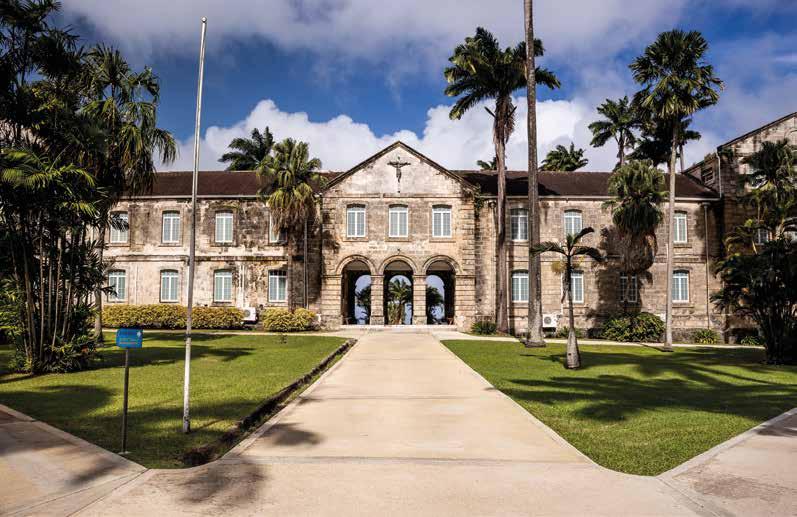
of Us’. Ella Sibley, Regional Manager for Europe and Nadia Sanchez, Regional Programme Coordinator for Europe attended the conference which also offered the opportunity to connect with many ecumenical partners.
A resource on the Legacies of Slavery coproduced by Dr Jo Sadgrove and The Revd Dr Evie Vernon, has now been finalised for publication.
Last year USPG collaborated with Hope for the Future in its ecological advocacy work across the UK. Last year also saw the implementation
of the second phase of the Partners in the Gospel Comprehensive Climate Change Knowledge & Climate Justice Campaign (PCC Campaign) which seeks to combat climate change through awareness raising in seven African countries (Malawi, Zambia, Zimbabwe, Tanzania, Seychelles, Madagascar, and Mauritius) totalling three provinces in Africa - Church Province of Central Africa, Anglican Church in the Indian Ocean and the Anglican Church of Tanzania. The Diocese of Lesotho of the Anglican Church in Southern Africa is also interested in becoming part of this campaign.
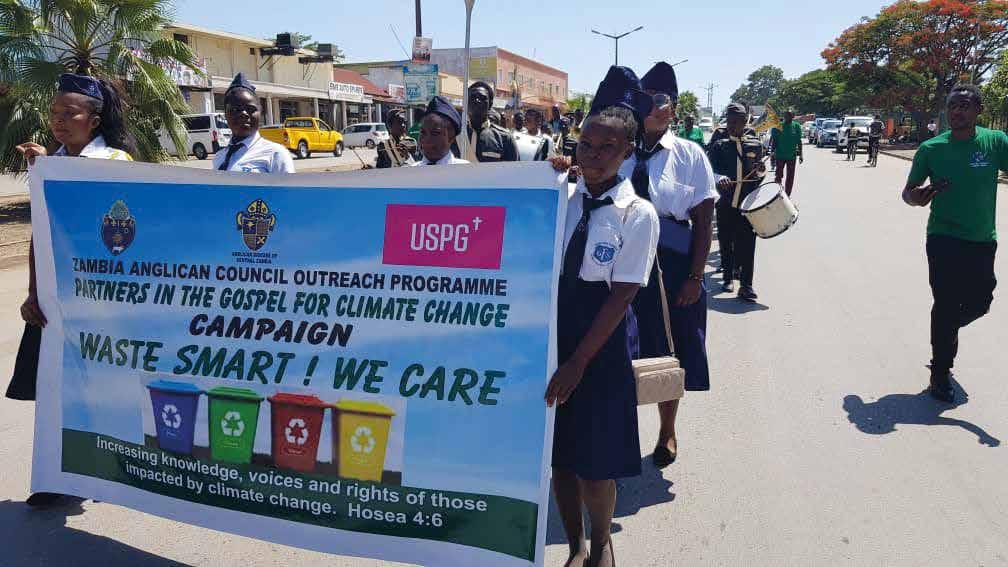
In continuation of its ongoing advocacy work in Brazil, USPG has supported the Anglican Diocese of Brasília’s Human Rights Advocacy Programme. One of the programme’s key achievements was its role in influencing the judicial decision on the ‘temporal marker’, a legal thesis affecting the demarcation of Indigenous lands. The Anglican Diocese of Brasília actively participated in public hearings and worked with other organisations to advocate for Indigenous territorial rights. Significantly, 174 federal legislators submitted a parliamentary inquiry request on the demarcation of Indigenous land, underscoring the office’s growing influence in policy discussions. The programme also focused on environmental advocacy, particularly against bills that would harm environmental and human rights. Education and awareness-raising were central to the programme’s strategy. They produced 37 impactful podcast episodes and participated in 40 public hearings, advocating for the rights of Indigenous peoples and environmental justice. These educational initiatives not only informed the public but also fostered broader engagement within the church and society on critical human rights issues.
The Anglican Church in Brazil has also implemented various initiatives relating to ecological discipleship. These have included tree planting, conversations around green principles, and faith-informed approaches to ecological stewardship. These activities have generated a stronger sense of community awareness of environmental challenges, and the congregations continue to raise funds for the care of God’s creation. More work on this area as we approach COP30 – the United Nations Climate Change conference in Belém, Brazil in November 2025.
USPG’s focus on economic justice in 2024 has been on forming strategic partnerships with Anglican and ecumenical bodies to advocate for economic justice. USPG’s relationship with the Just Money Movement (JMM) has been strengthened in 2024. In September, USPG alongside St Paul’s Cathedral, helped JMM to organise a panel event of theologians and thinkers on the theme, ‘Challenging our Extractive Economy: Money, Race and Climate’, which critiqued our dominant economic model and offered an alternative perspective from Christian theology. USPG is also engaged with the work of the NIFEA (New International Financial and Economic Architecture) work of the World Council of Churches (WCC) and supported the participation of Anglican participants in the GEM school (Ecumenical School on Governance, Economics and Management).
Another key initiative in the area of economic justice is the Anti-Human Trafficking (AHT) Programme of the Diocese of Durgapur, Church of North India. The programme has made a significant impact on the lives of vulnerable communities who live on the border between West Bengal and Bangladesh where the flesh trade is particularly rife. Upon the completion of three years of their phase two programme, an end of programme Learning Review Evaluation (LRE) was carried out by an external consultant. Based on the LRE recommendations, the Diocese of Durgapur has developed a new proposal for the next phase of the AHT programme, indicating the desire to expand the work to new target areas and six CNI dioceses over the next three years. This proposal received the approval of USPG Trustees.

As part of the Anglican Church of Brazil’s Human Rights Advocacy programme, representatives of churches participated in an interactive public hearing, held on 6 March 2024, in the Permanent Mixed Committee for Tackling Violence Against Women and interacted with parliamentarians about the role of the Brazilian Parliament to improve laws on prevention of violence against women. This public hearing focussed on developing a national public policy for eliminating violence against women. USPG also supported a ‘Safe Church’ training programme in Campo Grande, Brazil which aimed to raise awareness of the importance of creating a safe environment for vulnerable people. The gathering resulted in the development of a booklet that will serve
as a practical guide for creating Safe Church communities. In the Anglican Diocese of Paraná (DAPAR), a theological training programme on Gender-Based Violence was organised, which helped move the conversation from awareness to community action.
From 19-23 August 2024, a planning workshop to tackle gender injustice and gender-based violence (GBV) in Zambia was held in Lusaka. This initiative marks a step towards fostering gender justice and zero GBV. The workshop, organised by the Zambia Anglican Council Outreach Programme (ZACOP) and USPG, brought together representatives from the five dioceses of the Zambia Anglican Council encompassing priests, lay leaders, ministry leaders, and diocesan staff.
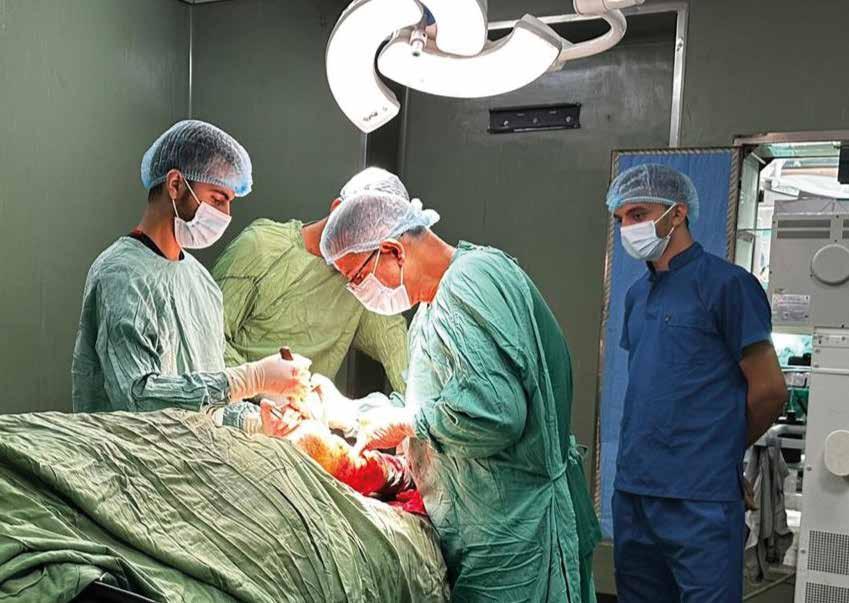
USPG continues to accompany the Diocese of Jerusalem (DOJ) in their response to the conflict in the Middle East through its medical institutions namely Al Ahli Hospital, St Luke’s Hospital, Nabulus and other clinics. In July the Israeli army attacked DOJ’s Al Ahli Hospital in Gaza and ordered its closure. The Anglican Alliance coalition of partners quickly issued a joint statement condemning the closure of the only medical facility in Gaza that was functioning. As a result of advocacy efforts, the Al Ahli Hospital re-opened and is currently offering urgent medical care and trauma support for those affected by the war. Our partners the Diocese of Jerusalem completed phase two of the Gaza crisis response with the help of International Partners through Anglican Alliance. USPG will continue its accompaniment through the Lent appeal 2025.
Over the last year in response to the felt need of partner churches, USPG has both consolidated as well as developed various initiatives that have the potential to support and strengthen key areas of mission including theological education, institutional leadership, youth empowerment and advocacy. As we move forward towards 2025 there is a healthy sense of achievement, but also the realisation that the consolidation of newly initiated programmes and renewed partnerships are going to be foundational for our work over the next four years of our 5-year strategic cycle. Therefore, the focus of 2025 will be on innovation within existing programmes and enhancing the effectiveness of ongoing work. This will be accompanied by nurturing our existing relationships with partners in the spirit of mutual trust, accountability and upbuilding as we seek to strive forward in our calling to be partners in God’s mission.
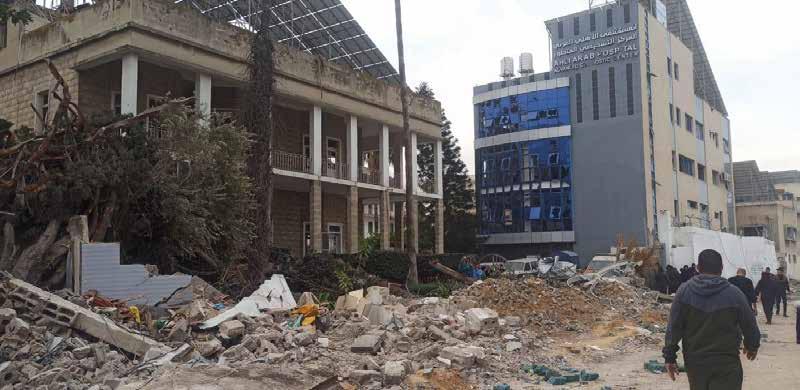
The Communications, Engagement and Fundraising (CEF) team have a vision to amplify USPG’s global voice across the nations by sharing moments of transformation, learning and celebration amongst supporters and partner churches. We have had a busy year of high productivity with the arrival of new team members, in particular our new church engagement team whom some of you may have met at our regional gatherings, events or festivals.
Some of our key highlights from the year include the success of our Lent Appeal which was focused on CASA+ HIV/AIDS stigma prevention in Brazil. We also held the annual USPG conference where we explored the theme ‘United Beyond Borders’, with keynote
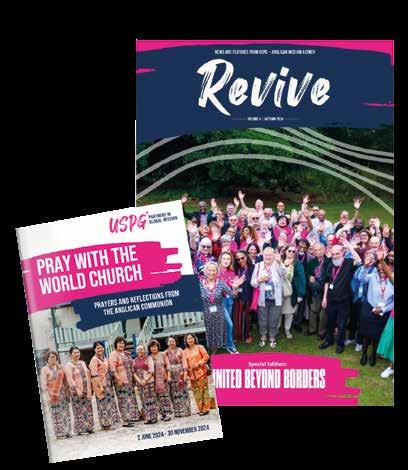
United States, UK, Africa and Europe. The conference was a rich exchange of dialogues between attendees and guest speakers and provided an amazing opportunity to be refreshed and recharged. We will be holding our next conference in July 2025 at the Hayes Swanwick, Derbyshire.
Another highlight was our Codrington Project Launch which took place in Barbados at the beginning of September 2024. This was a unique opportunity to listen to and capture stories from stakeholders within the Codrington Trust and the local Barbadian community, as well as spending time in reflection and prayer. We look forward to sharing more updates on this project as the year progresses. More information can be found on the project website on www. uspg.org.uk/codrington-project and www. codringtonproject.org.
Lastly, we launched our brand-new USPG website. The fresh design allows for easy navigation to support you in finding all the information you need about our programmes, how you can get involved, how to order resources and pray for our work.
Communications Highlights
Resources: USPG communications has seen the production of two bi-annual prayer diaries where we invite supporters and partners to pray for the global work of USPG. In addition to producing two editions of the Revive magazine, in Spring and Autumn. The magazine spotlights stories from across our global partnership work providing examples of how we apply our strategic aims of rethinking mission, energising church and championing justice. It also captures ways you can get involved during the life
of USPG whether as a volunteer speaker, a parish contact or as a fundraiser for USPG. In addition to our core resources, we also produce an annual bible study course which is released during Lent and widely requested by churches. We also produce bespoke resources and leaflets where there is opportunity to further share our work to new audiences such as our COP29 resource. You can now download all our resources via the new USPG website. We would love to hear what our supporters think about our resources. We encourage you to reach out to our communications team to share your thoughts with us.
Media: Over the year we published 32 stories and press releases capturing and spotlighting our work across the Anglican Communion with our global church partners. We saw significant success and prominence with our work on the Codrington Project which drew global and national media attention. Our activity around this project will continue to be an area of great importance, sensitivity and relevance. We will continue to provide updates on this long-term project which will span 10-15 years. The Codrington Trust and USPG hosted the launch event bringing together local politicians, residents, historians, artists, and faith representatives. It was also attended by key dignitaries including The Rt Revd Dr David Walker, The Bishop of Manchester, The Rt Revd and Rt Hon Dame Sarah Mullally DBE, The Bishop of London and The Most Revd Dr Cyril Kobina Ben-Smith, Primate of the Church of the Province of West Africa, along with the majority of the Steering Committee members, and key stakeholders that were essential to capturing and sharing the Codrington Project story. We look forward to sharing more updates as the project
progresses. For more information, please visit our website.
During the Codrington Project launch event, we received the highest number of press mentions in both print and digital media across national and international press outlets such as The Guardian newspaper, with at least two key notable news stories in addition to a series of radio mentions from key outlets such as the BBC. Our Codrington project remains a key highlight of our media work, aligning closely with our commitment to championing justice–particularly in the area of racial justice. We continue to support our global mission team in creating resources that equip church leaders to engage with the past and address its ongoing legacy, while also contributing to our broader focus on ecological, economic, and gender justice.
Digital communications: We launched our brand-new website which is more modern and provides greater functionality and accessibility to tell our stories and share our work with global partners and supporters. You will also notice that the website now reflects greater energy and activity, featuring more voices from across the nations and capturing the dynamic, ever-evolving nature of our missional work.
We have seen great success across our social media channels and platforms. This includes a total of over 4000 followers on Facebook, over 1000 followers on our Instagram channel in addition to growing supporters on our LinkedIn page and e-newsletter subscribers. We are also seeing high engagement on the back of our stories and requests for resources.
being rolled out. This new approach places greater emphasis on storytelling, deepening relationships with our supporters by inviting feedback, encouraging more interaction on social media, and increasing our visibility across various media platforms.
We will continue to release consistent ‘evergreen’ messaging around our key messages - essentially sharing who we are and what we do to generate further awareness about USPG. In addition to producing more shorter reel videos to introduce USPG to a more digitally friendly supporter base. In an effort to expand our global reach and strengthen engagement with supporters and church partners worldwide, we’ve begun offering translated resources to share our work more broadly.
Engagement Highlights
Events: The Engagement team ran a total of 22 events over the year. We attended the national Synods of all four churches in Britain and Ireland (England, Wales, Scotland and Ireland), participated at two key summer festivals (Greenbelt and Big Church festival), and held a challenge run and volunteer regional days in three key cities.
In April, we proudly hosted our first London Landmarks Half Marathon challenge, with nine runners taking part through charity places to raise funds for USPG. The team included both staff and volunteers, with many of the runners being new supporters. It was a fun and positive day and provided a fantastic opportunity to showcase USPG’s work to a wider audience.

parish contacts during national volunteer’s week in June. The new church engagement team met with our volunteers and supporters with a total of 47 people in attendance, providing a great opportunity to reintroduce our work. During the gatherings, we had many conversations about the volunteers’ experiences and discussed ways to enhance our volunteer engagement. As a result, attendees left better informed about our current programmes.
Strategy: We completed our five-year communications strategy, which is already
We also held three regional volunteers’ days in London, Leeds and Liverpool where it was a delight to connect with our volunteers and
To further strengthen USPG’s presence and influence in the UK, USPG initiated a new series of ‘In-Conversation’ evenings in 2024. Featuring speakers from our partner churches, in conversation meetings offer the opportunity for a select group of USPG stakeholders to engage in conversation on a key issue of importance for the future of Christian faith and global mission. The first ‘In-Conversation’
evening focused on ‘The New India and the Future of Christians’ and featured The Revd Dr Ajit Kumar, General Secretary of the Church of North India (CNI) as the main speaker. The second ‘In Conversation’ evening focused on Women’s Leadership in Africa in July 2024 and featured The Rt Revd Dr Vicenta Kgabe, Bishop of Lesotho as the guest speaker. The third “In Conversation” evening focused on the topic: “What is the Future for the Refugee Crisis in Europe?” and featured The Rt Revd Dr Robert Innes, Bishop in Europe and Madeleine Cuckson, Ukrainian Aid Programme Manager in Romania, who spoke passionately about the vital work taking place in the region.
We also held our annual USPG conference themed, ‘United Beyond Borders’. The central question we explored was: “In an increasingly volatile and bordered world how can we as
members of the one global Church embody Christ’s love and build bridges across the borders that divide us?” We had three keynote speakers and a guest speaker to lead us in our morning bible studies. Our keynote speakers were:
• The Very Revd Dr Kelly Brown DouglasDean, Episcopal Divinity School at Union Theological Seminary and Canon Theologian, Washington National Cathedral Theologian in Residence, Trinity Church Wall Street.
• The Rt Revd Dr Anderson Jeremiah - Bishop of Edmonton, Church of England
• Bradon Muilenburg - Anglican Refugee Support Lead in Northern France.
• And The Rt Revd Dr Dalcy Badeli DlaminiBishop of Eswatini, part of the “Africa Six” who led our Bible studies. We ended the year with a reflective carol service at St John’s Waterloo, where we were joined by the Sixteen Choir who led our carols, along with some special solo numbers. The evening was supported by Bible readings and reflections from each of our regional areas, led by staff and trustee members.
Strategy: We produced a five-year church engagement strategy with a key focus on ‘resourcing’ local churches. This will continue to help in the sharing of our work amongst current and prospective supporters. We envision the creation of a church toolkit with leaflets, posters and fundraising ideas
that would fully equip churches to share our missions work within their congregations.
Appeals: In 2024, we launched three appeals, aligned with the key moments of the church calendar including Lent, Harvest, and Christmas. Our Lent campaign received the most support. It was the first time we had featured a programme from Latin America and was delivered in partnership with the Anglican Episcopal Church of Brazil. We shared the story of Sinval and his mother Crueza spotlighting challenges around HIV & AIDS isolation and stigma. The Harvest appeal brought to light the issue of food insecurity in Zululand. In partnership with the Diocese of Zululand, we shared Mam’Getty’s story: a 72-year-old woman who represented a pillar of strength. Our Christmas appeal focused on community health care programmes run by the Church of Bangladesh in Barisal diocese. We featured a story from Anika, who shared her challenges of accessing healthcare due to the distance and high costs of travel.
Below is a table of the total amount of income we have raised in all three appeals. We want to take this time to say a big thank you for your generous donations. Your gifts are truly shaping and transforming communities, livelihoods and families across the world thanks to the important work of our global church partners.
Legacy giving: In 2024 we received 29 legacy gifts totalling over £594k which contribute directly to the global mission work of USPG. Thank you for being faithful supporters through leaving a gift in your will or via in-memory giving. Looking ahead to the following year, we have a strong pipeline of legacy gifts which continues to grow. If you haven’t yet considered or would like to find out more information about leaving a legacy or in-memory gift to USPG, please visit our website for more details www.uspg.org.uk/leave-a-legacy.
Fundraising strategy: We produced a fiveyear fundraising strategy identifying areas we need to prioritise as we monitor the changing economic climate. We will continuee to share our stories and work with our supporters, to be equipped and resourced to do more local fundraising. We have plans to increase our community fundraising activity and to diversify our fundraised income by looking at innovative ways to make it easy for supporters to get involved and fundraise for USPG.
Looking ahead: We will focus on four key pillars of strategy for the Communications, Engagement and Fundraising team: [1] the implementation of a diversified fundraising strategy, [2] how we tell our stories, [3] how we share our stories and [4] how we continue to engage and equip our supporters. You will see more stories coming through in our resources which continue to present a snapshot of our global missional work. Look out too for more creative ways of how we share our stories particularly on our digital platforms. We will continue to engage you (our supporters) with more physical resources for your local churches and groups that will help to further nurture your understanding of USPG and also build each other up in the faith. We will be launching our DIY Fundraising pack shortly for supporters to easily download and use, in addition to re-launching Partners in Mission – a regular giving programme that links you or your church to one of USPG’s programmes.

In September 2023, USPG announced the Codrington Project, a partnership with The Codrington Trust in Barbados to address the harms enacted by our shameful past involvement in plantation chattel slavery. From 1711 until emancipation in 1836, the Society for the Propagation of the Gospel managed two Barbadian sugar plantations, profiting from the labour of enslaved Africans. USPG (as the Society is now known) is committed to delivering £7m over ten to fifteen years towards a range of programmes in Barbados. One year on from the announcement, these are the key developments:
We have welcomed the eleven members of our international steering committee, including the eminent historian Sir Hiliary Beckles, ViceChancellor of the University of the West Indies
Chair
Commission, Dr Deborah Mack of the Smithsonian Museum of African American History, Dr Annalee Babb, digital transformation entrepreneur and Ambassador of Barbados to the UAE and two community representatives from the Codrington estate itself.
To understand and address the presentday issues for the local community of the Codrington estate, regular meetings with each of the five distinct districts have begun, providing a platform for community engagement and empowerment for the approximately two hundred tenants living on the estate.
Through wider engagement meetings, we have begun to build an expansive institutional network of church leaders and officials,
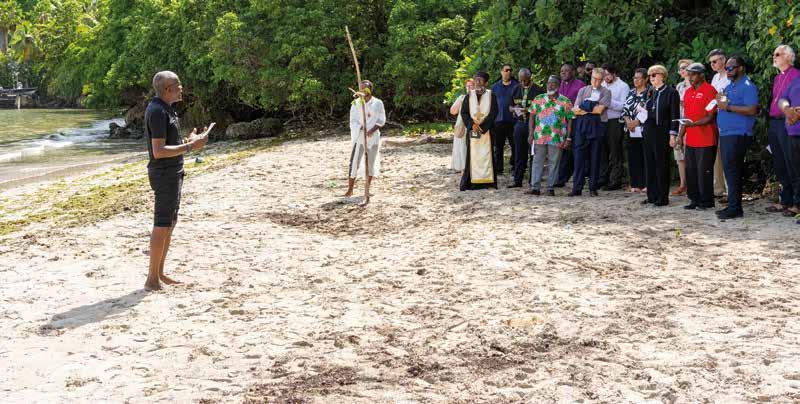
historians and academics, artists, and advocates from across the world with whom to collaborate, learn, share, and advocate towards the cause of this project.
Looking forward, our now fully staffed project team - led by Mr Kevin Farmer, the Executive Secretary of the Codrington Trust and Deputy Director of the Barbados Museum and Historical Society and USPG General Secretary supported by project officers, Alison Holder (Codrington Trust) Christopher Hill (USPG)have been busily planning the first range of programmes for the project’s first cycle, guided by the five key pillars of the project:
• Conduct research to locate the burial and habitation places of enslaved persons who worked on the Codrington estates of the Trust throughout its history, document the findings, and establish monuments to memorialise those persons, connect kinship and family groups, and recognise those areas as sacred spaces.
• Engage in academic work to record and present the full story of the estates throughout enslavement and emancipation to build a facility to house artefacts, narratives, and other materials to highlight through various media the enslaved experience and ensure that this tragedy is never forgotten.
• Undertake to improve the circumstances and standards of qualified tenants who are living on the estates, providing new facilities for leisure and community activities, and by assisting in acquiring freehold lots in accordance with the Tenantries Freehold Purchase Act and, considerations of proper infrastructure and Public Policy, and the requirements of as outlined in the Constitution of Barbados.
• Fuel the spirit of self-reliance, enterprise/ entrepreneurship amongst residents of the tenantries and wider community in St. John, on island, especially the youth in St. John, by providing scholarships and other opportunities to assist them to develop and utilise the benefits of our heritage and ancestral legacy. Such endeavours to be pursued must be undertaken in a cocommunity practice model which has at its core both the buy-in and recommendations of the community.
• Nurture a culture of theological enquiry and ministerial formation within Codrington College that engages critically and creatively with its history as a key institution within a Church, which legitimated both chattel slavery and the trade in enslaved persons. This will be achieved by the progressive development of its curriculum and the creation of courses that engage and influence contemporary theological research and writing around reparations within the Caribbean, but also internationally.
In 2025, the priorities will be to work with the local community to support tenants to acquire freehold lots and improve local facilities; to initiate schemes to support entrepreneurship and educational opportunities for the local community; to initiate work on tracing descendants through genealogical research and hosting an interdisciplinary conference in Barbados to establish the research programme.
In addition, the work is informing and strengthening our work on questions of racial justice in the UK and leading to the development of networks focussed on the issues of racial justice within the British churches.
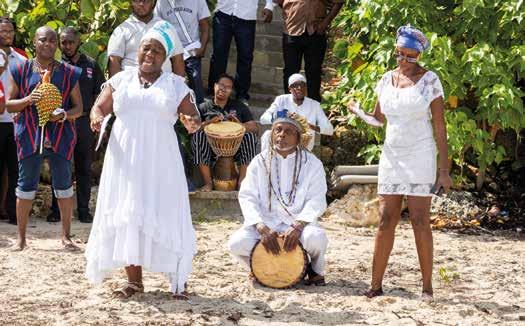
Traditional music and drumming, part of the service at Conset Bay
As a UK-based charity partnering with churches worldwide, USPG values diverse global perspectives. To support this, USPG has a Communion-Wide Advisory Group (CWAG) who offer guidance and leadership to our trustees, engaging critically with our vision and strategy, and serve as ambassadors within their regions. We committed to refreshing the members of the CWAG in 2024 and so appointed representatives from different parts of the Anglican Communion, with support from their provinces.
Meet the group:
Africa: The Most Revd Dr Cyril Kobina BenSmith, Primate of the Church of the Province of West Africa (CPWA) and Archbishop of Ghana; The Rt Revd Methlayothle Beleme, Bishop of Botswana, Church of the Province of Central Africa; and Mrs Essie Pato, Anglican Church of South Africa.
Asia: The Revd Lopa Mudra Mistry, Church of North India and The Rt Revd Datuk Danald
Jute, Bishop of Kuching, Church of the Province of South-East Asia.
Americas and the Caribbean: Dr Anita Gittens, Anglican Church of Canada and The Rt Revd Philip Wright, Bishop of Belize, Church of the Province of the West Indies.
Middle East: The Revd Wadie Far, Diocese of Jerusalem, Episcopal Church in Jerusalem and the Middle East.
Oceania: The Revd Sonja Hunter, Samoa, Anglican Church in Aotearoa, New Zealand and Polynesia;
Europe: Currently vacant
The group met in person in Kuching in March 2024, generously hosted by The Rt Revd Danald Jute. Two members of the group, Mrs Essie Pato and The Revd Wadie Far, respectively the Chair and Vice-Chair of CWAG, now serve on the Global Mission Programmes Committee of the Trustee Board.
CWAG members will be attending the USPG Conference at Swanwick in July 2025.
The trustees have pleasure in presenting their report for the year ended 31 December 2024. This report is prepared in accordance with the Royal Charter, the Bye-Laws and applicable law and United Kingdom Accounting Standards, including Financial Reporting Standard 102 The Financial Reporting Standard applicable in the UK and Republic of Ireland (United Kingdom Generally Accepted Accounting Practice).
Governing documentation and constitution
USPG (formally known as the United Society) is governed by its Royal Charter of 16 June 1701 as amended by the Supplemental Charter of 6 April 1882, the Supplemental Charter of 22 August 1921, the Supplemental Charter of 21 June 1956, the Supplemental Charter of 3 March 2014, the Orders of Council of 22 December 1964 and 19 November 1996. It became a registered charity on 26 August 1964.
In 2013 USPG petitioned for a new Supplemental Charter which was approved on 11 December 2013. The new Supplemental Charter restates and replaces as appropriate the provisions and effects of the Original Charter of 16 June 1701 and the three Supplemental Charters as amended in order better to regulate USPG’s constitutional affairs, including changing the name and its charitable objects.
This Supplemental Charter officially changed USPG’s name from the United Society for the Propagation of the Gospel (USPG) to The United Society.
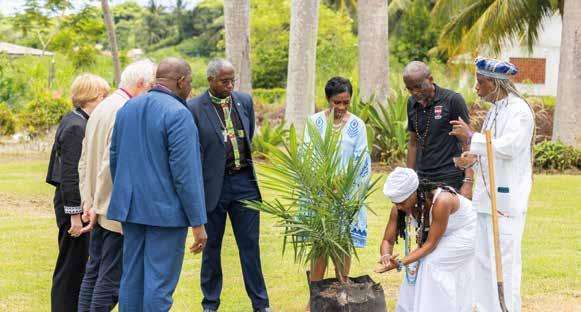
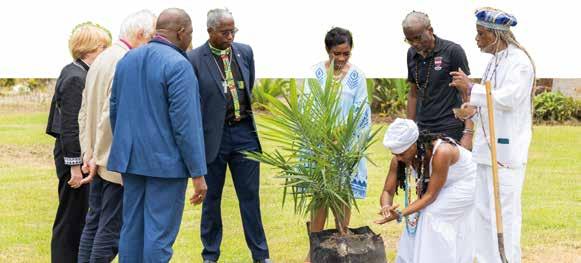
For the Year Ended 31 December 2024
In June 2016, the Society changed its trading name to United Society Partners in the Gospel (to be known as USPG). The Society is now known as USPG.
The objects of USPG are to advance the Christian religion in accordance with the principles and practices of the Anglican churches of Britain and Ireland amongst the churches of the Anglican Communion and the communities they serve, throughout the world, including through, but not limited to, the following means:
The relief of poverty; The promotion of good health;
The advancement of education and the development of the capacity and skills of socially and economically disadvantaged members of such communities in such a way that they are better able to identify, and help meet their needs and to participate more fully in society; The training, development and other support of church leaders; The provision of advocacy and working collaboratively with such churches and communities; and any other means aimed at improving conditions of life and prospects for the future as the Trustees shall deem fit in accordance with the principles of the Christian religion as practiced in the Anglican Communion; including acting in co-


operation with Partners in order to achieve such charitable outcomes.
The General Secretary and the Directors, who are responsible for the day-to-day management of USPG, during 2024 and at the date of this report, are shown on page 3.
The Charity Trustees of USPG, who are elected by the Council, during 2024 and at the date of this report, are shown on page 2. The search for new trustees is carried out by the Recruitment Committee, having identified the areas of experience or knowledge required by the trustees. A process of advertising and/ or direct approach to people suggested is adopted. The Recruitment Committee itself is elected by USPG’s Council and chaired by The Revd Paul Gurnham. Once elected, trustees undergo a formal induction process. Trustees are given the opportunity to attend appropriate seminars and courses.
The three regular sub-committees of the Board of Trustees are the Finance and Audit Committee, the People and Culture Committee (previously known as Remuneration and Personnel Policy Committee) and Global Mission Programmes Committee.
Council has a membership of up to 141 persons who reflect both USPG’s standing in the structures of the church and the support it receives as a voluntary organisation.
The trustees are responsible for preparing the Report of the Trustees and Members and the financial statements in accordance with applicable law and United Kingdom Accounting Standards (United Kingdom Generally Accepted Accounting Practice) including Financial Reporting Standard 102 “The Financial Reporting Standard applicable in the UK and Republic of Ireland”.
The law applicable to charities in England and Wales, the Charities Act 2011, Charity (Accounts and Reports) Regulations 2008 and the provisions of the Royal Charter require the trustees to prepare financial statements for each financial year which give a true and fair view of the state of affairs of the charity and of the incoming resources and application of resources, including the income and expenditure, of the charity for that period. In preparing those financial statements, the trustees are required to:
select suitable accounting policies and then apply them consistently; observe the methods and principles in the Charity SORP; make judgements and estimates that are reasonable and prudent; prepare the financial statements on the going concern basis unless it is inappropriate to presume that the charity will continue in business.
provisions of the Royal Charter. They are also responsible for safeguarding the assets of the charity and hence for taking reasonable steps for the prevention and detection of fraud and other irregularities.
Trustees have a responsibility to prepare the financial statements on a going concern basis unless it is inappropriate to presume that the organisation will continue in operation. An entity is a going concern unless management either intends to liquidate the entity or to cease trading or has no realistic alternative but to do so.
The trustees have no doubt that USPG remains a going concern. USPG has substantial reserves held in investment assets, totalling £58.3 million at 31 December 2024. The strength of USPG’s balance sheet provides additional comfort that USPG will remain a going concern for the foreseeable future.
The trustees have a risk management strategy which identifies the major risks to which the charity is exposed and the possible impact of these risks. Established systems are in place through the annual risk register review and quarterly management reports to review both the risks and the effectiveness of the controls. The top 10 risks facing the charity are reviewed regularly by the Trustee Board. These include:
Trustees continued to meet regularly throughout 2024, in order to exercise their governance responsibilities. Council met in person on Friday, 10 July 2024 at High Leigh Conference Centre, Lord St, Hoddesdon EN11 8SG.
The trustees, advised by senior staff, are responsible for keeping proper accounting records which disclose with reasonable accuracy at any time the financial position of the charity and to enable them to ensure that the financial statements comply with the Charities Act 2011, the Charity (Accounts and Reports) Regulations 2008 and the
Financial risks – In 2024 there was an overall decrease income of 7% in income primarily caused by a decrease in donations and legacies. Management information is provided on a monthly basis, so that management can respond quickly to changes in the organisation’s income and expenditure
and reduce expenditure where necessary. The strength of the balance sheet gives resilience against the short-term impact of any reductions in income. Significant investment has been made in staffing to increase fundraising capacity, although it will take a number of years to see the full benefit of this. The intention is to build a more stable platform of regular donations. In 2025, USPG is anticipating an increase in donations from individuals and appeals income.
Operational risks – Two significant operational activities of USPG are travelling overseas to see first-hand the impact of USPG’s programmes, and face to face engagements with supporters in Britain and Ireland. During 2024, USPG staff have visited its programmes in partner churches around the world. All travel is covered by adequate insurance. All staff visiting the partner churches are DBS checked, provided safeguarding training for working in international context, are provided with contact details for emergencies and are accompanied by partner churches in the local regions. Staff are required to complete a travel check list before travelling, including medical checkups and a risk assessment. We have appointed skilled staff to engage with supporters in Britain and Ireland.
Reputational and historic risks – Being a charity with a history of slave ownership on a Barbadian plantation, there is a risk of damage to our relationship with partner churches, our donors and stakeholders. Addressing legacies of slavery and contemporary issues of racism are a key part of our strategy. We are engaging with these issues proactively; creating a communications strategy and taking an open approach. We have started Renewal & Reconciliation: The Codrington Project which
is a long-term project which will span 10-15 years. As an organisation that has engaged in the movement of people around the world, there is also a risk of historic safeguarding claims, which can cause significant reputational damage, legal proceedings and a drop in support from our donors and stakeholders. We manage all the records effectively, respond efficiently to inquiries, take legal advice and have appropriate insurance.
Lack of Effective Communication – As a historic and international organisation relying on varied stakeholders for support, donations and partnership, lack of effective communications can pose a risk which can impact our relationship with all the supporters. To mitigate the risk, we have appointed skilled staff who are working on a clear communications strategy to engage with relevant stakeholders.
Property and cyber risks – There are no major known risks associated with the property, except those associated with wear and tear and general maintenance. These are being mitigated by using appropriate professional advice and maintenance contracts. Trustees with relevant expertise are regularly involved on property issues. The property is covered by adequate insurance. With the increase in cyber-attack and cyber-crime generally in the country, we have taken additional steps to mitigate risk by working with our IT supplier and have increased contracted support to higher level, applying security policies including multi-factor authentication and use of complex passwords. We have adequate cyber insurance.
Compliance risks – In addition to data protection legislation, fire, health & safety,
there are new guidelines and regular updates from HMRC including those associated with business support and VAT. The Charity Commission and the Pensions Regulator have also issued guidance on how charities should plan and respond to risk. These are being mitigated by regular reviewing of policies and procedures in place and responding to changes.
The trustees confirm they have complied with the duty in section 4 of the Charities Act 2006 to have due regard to public benefit guidance published by the Charity Commission in determining the activities undertaken by the charity. Reflecting USPG‘s objectives, its history and current activities, USPG has always seen its role as part of God’s mission, seeking to bring his reconciling love to all peoples and in all places. The trustees believe the Christian faith is of benefit to individuals and society as a whole. As a church-based charity with a wide range of international programmes and relationships, USPG aims to share this benefit with others. How this is done is explained throughout this Report.
The Board considers that the trustees and the Senior Leadership Team, as set out in note 15 of the accounts, comprise the key management personnel of USPG in charge of directing and controlling, running and operating USPG on a day-to-day basis. All trustees give of their time freely and no trustee received remuneration in the year. Details of trustees’ expenses are disclosed in note 14 of the accounts.
USPG works to comply with all relevant statutory regulations, including the Charities Act 2011, the Charities (Protection and Social Investment) Act 2016 and the Data Protection Act 2018. USPG is registered with the Fundraising Regulator and adheres to its Code of Fundraising Practice. In 2024 there were no failures to comply with this code of practice.
USPG uses a wide range of approaches to raise money, such as working with individuals, major donors, trusts, churches and dioceses, as well as contacting existing supporters. Print advertising, digital advertising, social media and a suite of resources are also used to promote fundraising campaigns. USPG works with volunteers to support the organisation to raising awareness and funds in their local parishes. USPG’s internal fundraising team conducts this activity as part of the wider Communications, Engagement & Fundraising Directorate.
Supporters and members of the public continue to be given support when undertaking fundraising activities. Guidance is in place about treating supporters fairly, including protecting supporters in vulnerable circumstances, and is followed across all fundraising activities.
In 2024, USPG received two complaints about its fundraising practice. Staff seek to improve USPG’s fundraising and marketing practice continuously. As well as adhering to the regulator’s complaints reporting guidelines, USPG is committed to fair, honest and open fundraising.
During the year 2024, USPG had a decrease of 7% in overall income, from £3.680m (2023) to £3.411m (2024). This decrease is primarily
due to a decrease in donations and legacies. The other income includes festina loans converted to donations and write off. USPG investments increased in value due to external market factors. This resulted in a capital gain of £1.227m in 2024 (2023: capital gain £3.662m), with investment income of £1.832m (2023: £1.853m).
USPG purchased 5 Trinity Street in 2018 and completed its refurbishment in 2019. In the first quarter of 2020 a 5-year lease was secured with a local firm of solicitors for 27% of the available floor space. This rental income is reported within restricted income. The property is reflected on the balance sheet partly within fixed assets and partly as an investment property within the investment portfolio.
Good progress has been made with the agreed strategy of putting USPG on a sustainable financial footing. We continue to work on achieving balanced books on unrestricted funds. In the last two years we achieved this aim, but this year due to decrease in donations and legacies, this has not been possible. We have appointed staff and devised a strategy to increase our income.
Donations from individuals and churches are an important source for USPG’s unrestricted income. These decreased from £761k to £758k. Legacy income also decreased from £866k to £594k. Legacy income, by its very nature, fluctuates from year to year. USPG continues to be enormously grateful to those who arrange to support its work through legacies and donations.
deficit on restricted funds of £154k (2023: £365k deficit), making a total deficit of £786k (2023: £232k deficit). The trustees plan to spend down balances on restricted funds (note 9) where it is appropriate to do so.
The investment gains for the year were £1.227m (2023: gains £3.662m).
In 2024 the FRS 102 actuarial liability on the pension schemes was nil, similar to year 2023. This has resulted in a positive adjustment of £140k against unrestricted reserves.
The year ended with a deficit on unrestricted funds of £632k (2023: £133k surplus) and a
The income chart shows that overall operational income for 2024 was lower compared to 2023. Income from donations and legacies was lower, but we had a new source of income through grants from partnership. Investment income was also lower, whilst other sources of income were higher due to the write-off and donations for festina loans. Overall operational income was lower by 7%.
The expenditure chart shows that overall expenditure was higher in 2024 compared to 2023. All categories of expenditure were higher in 2024, especially programme expenditure with a 7% increase. Overall expenditure was also higher by 7%.
The two charts below show the distribution of income and expenditure during 2024. 54% income was generated from investments, while donations and legacies generated 18% and 17% respectively. In terms of expenditure 82% was spent on programmes while the cost of generating funds was 13% and governance costs were 5%.
USPG prepares a budget each year and a rolling forecast, together with management accounts and cash flow statements. These reports are discussed by the Senior Leadership Team and are scrutinised by the Finance and Audit Committee prior to submission to the Board of Trustees. The Finance and Audit Committee meets four times a year.
There is a strong budgetary control environment where each expenditure item is authorised by the budget holder and checked by the finance team against approved budgets. Internal control procedures are in place regarding opening of mail, purchase ledger processing, banking (including internet banking) and cheque payments (which have been significantly reduced). These controls are reviewed regularly in relation to their effectiveness and robustness.
Trustees and the senior staff of USPG are made aware of any potential conflict(s) of interest and are required to complete a related party declaration as and when a potential conflict arises, and also at the end of the year as part of the annual audit process.
Under the Supplemental Charter of 21 June 1956, as amended by the Order in Council dated 19 November 1996 and the Supplemental Charter of 3 March 2014 the trustees have full and unrestricted powers of investment in respect of USPG general funds, and the endowment funds are invested according to the requirement of individual funds. All investments held by USPG have been acquired in accordance with the powers available to the trustees.
CCLA Investment Management Ltd now manages more than 93 per cent of USPG’s funds through their range of pooled funds, with The Charities Property Fund managing the balance. At December 2024, the total market value of funds managed by CCLA was £54.493m (2023: £53.298m) and the Charities Property Fund, £3.811m (2023: £3.790m).
USPG has adopted the ethical investment policy of the Church of England, as recommended by the Church’s Ethical Investment Advisory Group, which has three National Investing Bodies (NIBs): The Church Commissioners for England, the CBF Church of England Funds and the Church of England Pensions Board. The NIBs are asset owners who invest on behalf of many beneficiaries. The way in which they invest forms an integral part of the Church of England’s witness and mission. The NIBs receive advice and support on ethical investment from the Church’s Ethical Investment Advisory Group (EIAG). The purpose of the EIAG is to enable the NIBs to act as distinctively Christian – and Anglican – institutional investors. The EIAG develop ethical investment policy recommendations which, once agreed by the NIBs, are adopted by them, communicated to the wider Church and implemented.
USPG invests in assets and asset classes through pooled funds. Pooled funds are funds in which several different investors invest. The pooled funds apply the investment policies consistent with the ethical investment guidance of the EIAG.
performance, set annual income targets, as well as receive evidence that the ethical investment policy is being adhered to.
USPG’s reserves
USPG’s reserves are a complex mix of unrestricted funds (free reserves), designated funds and restricted funds.
These are reserves that are available without restriction to fund working capital, shortfalls in income, innovations, unexpected expenditure or other financial obligations. Recognising the need to maintain continuity of funding of programmes, many of which are approved over a 3-year period in anticipation of income each year, trustees assess the level of free reserves considered appropriate to ensure USPG’s continued ability to carry out its objectives as well as manage risks and future liabilities. The reserves policy anticipates that the level of reserves should represent at least 12 months’ operational costs.
The trustees meet with the investment managers twice a year to review their
The free reserve at 31 December 2024 was £11.521m (2023: £11.840m), which represents approximately 57 months of operational costs as per the 2025 budget. The free reserves represent investments, which generate income for the charity. The high level of investments held as free reserves generate more than 50% of the income the charity requires to run its operation. This income generated from the investments held as free reserves gives our charity confidence in its future projected income and enables long term commitments to be made for three to five years ahead.
Designated funds total £39k (2023: £212k). In 2016, trustees made a policy to designate funds each year to cover the defined benefit pension schemes deficit as per the FRS 102 valuation at the year end. This year, the deficit decrease was nil - the same as last year.
USPG guarantees interest free loans from supporters who have contributed into the Festina loans fund. The balance of these guaranteed loans of £166k has been written off after due process. The designated fund was transferred to general fund.
The restricted funds are funds earmarked for specific geographical regions or objects and cannot be spent until due diligence and other conditions in those areas are met. Restricted income funds total £1.364m (2023: £1.518m) and endowment funds total £48.799m (2023: £47.572m). These do not form part of our free reserves as trustees have to comply with the relevant restrictions. Unspent restricted funds in the year are carried forward into the subsequent year to comply with the donors’ specific requirements. Trustees have a plan in place to spend down the accumulated restricted funds and this is reflected in the reduced restricted fund balance at the year end.
This Report was approved by the trustees on 14 May 2025 and is signed on their behalf by The Rt Revd Dr David Walker, Chair of Trustees.
Rt Revd Dr David Walker Chair of Trustees
Opinion on financial statements
We have audited the financial statements of The United Society for the year ended 31 December 2024 which comprise the Statement of Financial Activities, the Balance Sheet, Statement of Cash Flows and notes to the financial statements, including a summary of significant accounting policies. The financial reporting framework that has been applied in their preparation is applicable law and United Kingdom Accounting Standards, including Financial Reporting Standard 102 ‘The Financial Reporting Standard applicable in the UK and Republic of Ireland’ (United Kingdom Generally Accepted Accounting Practice).
In our opinion the financial statements:
• give a true and fair view of the state of the charity’s affairs as at 31 December 2024 and of its incoming resources and application of resources for the year then ended;
• have been properly prepared in accordance with United Kingdom Generally Accepted Accounting Practice; and
• have been prepared in accordance with the Charities Act 2011.
Basis of opinion
We conducted our audit in accordance with International Standards on Auditing (UK) (ISAs (UK)) and applicable law. Our responsibilities under those standards are further described in the Auditor’s responsibilities for the audit of the financial statements section of our report. We are independent of the charity in accordance with the ethical requirements that are relevant to our audit of the financial statements in the UK, including the FRC’s Ethical Standard, and we have fulfilled our other ethical responsibilities in accordance with these requirements. We believe that
the audit evidence we have obtained is sufficient and appropriate to provide a basis for our opinion.
Conclusions relating to going concern In auditing the financial statements, we have concluded that the trustees’ use of the going concern basis of accounting in the preparation of the financial statements is appropriate.
Based on the work we have performed, we have not identified any material uncertainties relating to events or conditions that, individually or collectively, may cast significant doubt on the charity’s ability to continue as a going concern for a period of at least twelve months from when the financial statements are authorised for issue.
Our responsibilities and the responsibilities of the trustees with respect to going concern are described in the relevant sections of this report.
Other information
The other information comprises the information included in the annual report, other than the financial statements and our auditor’s report thereon. The trustees are responsible for the other information. Our opinion on the financial statements does not cover the other information and we do not express any form of assurance conclusion thereon.
Our responsibility is to read the other information and, in doing so, consider whether the other information is materially inconsistent with the financial statements, or our knowledge obtained in the course of the audit or otherwise appears to be materially misstated. If we identify such material inconsistencies or apparent material
misstatements, we are required to determine whether there is a material misstatement in the financial statements themselves. If, based on the work we have performed, we conclude that there is a material misstatement of this other information, we are required to report that fact.
We have nothing to report in this regard.
Matters on which we are required to report by exception
We have nothing to report in respect of the following matters in relation to which the Charities (Accounts and Reports) Regulations 2008 require us to report to you if, in our opinion:
• the information given in the financial statements is inconsistent in any material respect with the trustees’ report; or
• sufficient accounting records have not been kept; or
• the financial statements are not in agreement with the accounting records; or
• we have not received all the information and explanations we require for our audit.
As explained more fully in the Trustees’ Responsibilities Statement set out on page 19, the Trustees are responsible for the preparation of the financial statements and for being satisfied that they give a true and fair view, and for such internal control as the trustees determine is necessary to enable the preparation of financial statements that are free from material misstatement, whether due to fraud or error.
In preparing the financial statements, the trustees are responsible for assessing the charity’s ability to continue as a going concern,
disclosing, as applicable, matters related to going concern and using the going concern basis of accounting unless the trustees either intend to liquidate the company or to cease operations, or have no realistic alternative but to do so.
Auditor’s responsibilities for the audit of the financial statements
We have been appointed as auditor under section 144 of the Charities Act 2011 and report in accordance with the Act and relevant regulations made or having effect thereunder.
Our objectives are to obtain reasonable assurance about whether the financial statements as a whole are free from material misstatement, whether due to fraud or error, and to issue an auditor’s report that includes our opinion. Reasonable assurance is a high level of assurance but is not a guarantee that an audit conducted in accordance with ISAs (UK) will always detect a material misstatement when it exists. Misstatements can arise from fraud or error and are considered material if, individually or in the aggregate, they could reasonably be expected to influence the economic decisions of users taken on the basis of these financial statements.
Irregularities, including fraud, are instances of non-compliance with laws and regulations. We design procedures in line with our responsibilities, outlined above, to detect material misstatements in respect of irregularities, including fraud. The extent to which our procedures are capable of detecting irregularities, including fraud is detailed below:
• The Charity is required to comply with charity law and based on our knowledge of its activities, we identified that the legal requirement to accurately account for restricted funds was of key significance.
• We gained an understanding of how the charity complied with its legal and regulatory framework, including the requirement to properly account for restricted funds, through discussions with management and a review of the documented policies, procedures and controls.
• The audit team, which is experienced in the audit of charities, considered the charity’s susceptibility to material misstatement and how fraud may occur. Our considerations included the risk of management override.
• Our approach was to check that all restricted income was properly identified and separately accounted for and to ensure that only valid and appropriate expenditure was charged to restricted funds. This included reviewing journal adjustments and unusual transactions.
A further description of our responsibilities for the audit of the financial statements is located on the Financial Reporting Council’s website at: www.frc.org.uk/auditorsresponsibilities. This description forms part of our auditor’s report.
This report is made solely to the charity’s trustees, as a body, in accordance with Part 4 of the Charities (Accounts and Reports) Regulations 2008. Our audit work has been undertaken, so that we might state to the charity’s trustees those matters we are required to state to them in an auditor’s report and for no other purpose. To the fullest extent permitted by law, we do not accept or assume responsibility to anyone other than the charity and the charity’s trustees as a body, for our audit work, for this report or for the opinions we have formed.
Knox Cropper LLP
Chartered Accountants
Statutory Auditor
65 Leadenhall Street
London
EC3A 2AD

Knox Cropper LLP is eligible for appointment as auditor of the charity by virtue of its eligibility for appointment as auditor of a company under section 1212 of the Companies Act 2006.

For the Year Ended 31 December 2024
The notes on pages 41 to 53 form part of these accounts. The statement of financial activities includes all gains and losses recognised in the year. All income and expenditure derived from continuing activities. Transfers between funds represent the adjustment to the designation of general funds to match the future pension liabilities.
THE FUNDS OF THE SOCIETY :
The Rt Rev'd Dr David Walker Chair of Trustees 14-May-25 David Walker
The financial statements have been prepared in accordance with Accounting and Reporting by Charities: Statement of Recommended Practice applicable to charities preparing their accounts in accordance with the Financial Reporting Standard applicable in the UK (FRS 102) (effective 1 January 2019) – (Charities SORP (FRS 102)). The United Society meets the definition of a public benefit entity under FRS 102. Assets and liabilities are initially recognised at historical cost or transaction value unless otherwise stated in the relevant accounting policy or notes
The trustees consider that there are no material uncertainties about the Charity’s ability to continue as a going concern. In forming this opinion, they have considered the impact of the cost of living crisis and changes in financial markets on both its income and expenditure and the carrying value of its assets and liabilities for a period of at least twelve months from the date of approval of these financial statements.
a. Donation, legacies and fundraising income
These are recognised in the accounts when received or when the charity becomes legally entitled to them and they can be reasonably measured. Income received for general purposes of the Charity are included as unrestricted funds. Income for activities restricted by the wishes of the donor or the terms of the particular trust deed is taken to restricted income funds. Income required to be retained as capital in accordance with the donor’s wishes are accounted for as endowments – permanent or expendable according to the nature of the restriction.
b. Investment income
Investment income is accounted for as it accrues. Investment income to be spent in accordance with the particular terms of a trust is included in restricted income funds
c. Expenditure
Resources expended are accounted for on an accruals basis. Support costs which cannot be directly apportioned are allocated between cost categories on the basis of the trustees’ estimate of the time spent on the relevant functions. Cost of generating funds comprises expenditure incurred by the charity in appealing for donations. Cost of charitable activities consist of all expenditure directly relating to the objects of the Society together with an allocation of support costs. International programmes costs: these are the costs of programmes across the Anglican Communion developed jointly with our partners. Programmes costs are approved by trustees as part of the overall budget of the Society on an annual basis. Funding for these Programmes are formalised through a Memorandum of Understanding (MoU). Governance costs comprise expenditure on management and compliance with constitutional and statutory requirements together with an allocation of support costs.
Investments
Investment properties are included in investments and are stated at trustees’ valuation based on similar properties being sold in the area. Other investments are stated at market value. Gains (or losses) are reflected in the Statement of Financial Activities in the year in which they occur.
e. Depreciation of tangible fixed assets
General minor office equipment is charged to resources expended in the year that the expenditure is incurred. For the purpose of depreciation, property is separated out into components such as structure, land, lift, machinery and air conditioning equipment. The depreciation rates in use are the following : major office and computer equipment at 20 per cent on costs, Properties at 2 per cent of cost less the value of land and plant at 25 per cent on costs.
f. Property
The property is used for partial own office use and part to earn rental income. The part for rental is classified as investment property and accounted for separately in the accounts using floor space.
g. Pensions
The Charity operates and contributes to two defined benefit schemes and one workplace pension scheme. The amounts included within the Statement of Financial activities and Balance Sheet is in accordance with the requirements of Financial Reporting Standard 17: Retirement Benefits (FRS102).
h. Fund accounting
Details of the nature and purpose of each fund are set out in notes 7 to 10.
i. Debtors
Short-term debtors are measured at transaction price, less any impairment. Loans receivable are measured initially at fair value, net of transaction costs, and are measured subsequently at amortised cost using the effective interest method, less any impairment.
j. Cash and cash equivalents
Cash is represented by cash in hand and deposits with financial institutions repayable without penalty on notice of not more than 24 hours. Cash equivalents are highly liquid investments that mature in no more than three months from the date of acquisition and that are readily convertible to known amounts of cash with insignificant risk of change in value.
k. Creditors
Short-term creditors are measured at the transaction price. Other financial liabilities, including bank loans, are measured initially at fair value, net of transaction costs, and are measured subsequently at amortised cost using the effective interest method.
*Freehold Property includes the portion of the purchase of the 5 Trinity Street that is not treated as an Investment Property. This property purchase was funded from the Africa expendable endowment fund.
The Charity’s property, 5-13 Trinity Street, is used mainly as an office but a significant portion is leased to a third party. Whereas the portion occupied by the Charity is carried at depreciated cost, the portion leased to a third party is treated as an investment property and carried at fair value. The Trustees consider the fair value of the investment property annually and last year they commissioned Charles Ingleby of Ingleby Trice, a RICS registered valuer, to ascertain the fair value of the property as at 31 December 2023. The valuation is based on estimated rental value (ERV) and has been made in accordance with the Royal Institution of Chartered Surveyors Red Book effective from 31 January 2022. Apportionment of the valuation between tangible fixed assets (which will continue to be carried at depreciated cost) and investment property is based on floor space. For the current year the Trustees have commissioned Charles Ingleby to confirm that in their opinion they do not consider there has been a material change in the valuation of the property as at 31 December 2024, assuming that there have been no changes to the tenures, tenancies or general conditions and specifications set out in the original report. Therefore, the Trustees are of the opinion that the current carrying value for the investment property is not materially misstated.
Financial assets measured at fair value comprise listed investments.
Financial assets measured at amortised cost comprise loans, trade and other debtors
Financial liabilities measured at amortised cost comprise loans, amounts due to overseas partners, trade and other creditors.
6. Creditors :
*During the year the trustees decided to write off outstanding Festina loans payable after due process to donations and other income as it was not possible to identify who to make payment to, and no contacts have been made by the lenders in more than 20 years.
General funds are funds where both the capital and income can be spent at the discretion of the trustees in furtherance of the objects of the Society.
Designated funds are unrestricted funds which have been designated by the trustees for particular purposes. The designated funds include the following:
These funds are analysed in accordance with the purpose specified by the donor, the terms of the particular trust or the geographical areas of the world where the income should be spent.
Legacies and donations
This fund represents legacies and donations received which have to be spent in geographical areas as per the wishes of the donor.
Expendable Endowment Funds
These are funds where the capital must be retained and only the income used in accordance with the terms of a trust or the wishes of the donor. These have been analysed above in accordance with how the income generated from the funds is to be spent.
These are funds where the capital must be retained and only the income used in accordance with the terms of a trust, until such times as the trustees elect in accordance with the terms of the trust to apply the capital as income. This is shown by way of a transfer from the endowment funds to the restricted or unrestricted funds.
Donations are received from churches within Britain and Ireland, mainly from Parochial Church Councils and from other charitable trusts and individuals.
Legacies are received from departed supporters within Britain and Ireland.
Residuary legacies notified before the year end but for which the value was uncertain have not been accrued.
Financial Reporting Standard 102 (FRS 102) requires disclosure of the charity's assets and liabilities of the USPG Overseas and Home Pension Scheme, both of which are defined benefits schemes.
A qualified independent actuary has made the valuations based on the following assumptions:
Post retirement mortality assumption
Commutation
S3NA tables with CMI-2023 projections using a long term improvement rate of 1.25% p.a. The initial addition is 0.5% p.a. The 2020 and 2021 weight parameters are 0% and the 2022 and 2023 weight parameters are 15%.
75% of members are assumed to take the maximum tax free cash possible, using factors in force as at 31 December 2024
S3NA tables with CMI-2021 projections using a long term improvement rate of 1.25% p.a. The initial addition is 0.5% p.a. The 2020 and 2021 parameters are 10%.
75% of members are assumed to take the maximum tax free cash possible, using factors in force as at 31 December 2023
*This accounting surplus has been restricted to nil through assets ceiling as charity does not believe that this can gain future economic benefit in the form of a future refund.
recognised in the Statement of Financial Activities account over the
